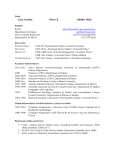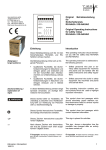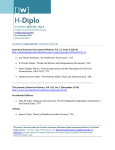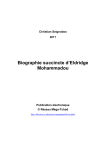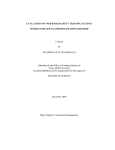Download Journals from J to Z
Transcript
[jw] H-Diplo JOURNAL WATCH, A to I H-Diplo Journal and Periodical Review www.h-net.org/~diplo/journals/ Fourth Quarter 2013 16 October 2013 Compiled by Lubna Qureshi, Stockholm University The Journal of African History, Vol. 54, Issue 2 (July 2013) http://journals.cambridge.org/action/displayIssue?decade=2010&jid=AFH&volumeId=54 &issueId=02&iid=8961482 • • • • • • Judith Spicksley, “Pawns on the Gold Coast: The Rise of Asante and Shifts in Security for Debt, 1680-1750,” 147. Christopher Vaughan, “Violence and Regulation in the Darfur-Chad Borderland, c. 1909-56: Policing a Colonial Boundary, 177. Matthew V. Bender, “Being ‘Chagga’: Natural Resources, Political Activism, and Identity on Kilimanjaro,” 199. Paul Darby, “’Let Us Rally Around the Flag’: Football, Nation-Building, and PanAfricanism in Kwame Nkrumah’s Ghana,” 221. Leslie Hadfield, “Challenging the Status Quo: Young Women and Men in Black Consciousness Community Work, 1970s South Africa,” 247. Wyatt MacGaffey, “A Note on Vansina’s Invention of Matrilinearity,” 269. _________________________________________________________________________________________________ Journal of American-East Asian Relations, Vol. 20, Issue 1 (2013) http://booksandjournals.brillonline.com/content/18765610/20/1 Copyright © 2013 H-Net: Humanities and Social Sciences Online. H-Net permits the redistribution and reprinting of this work for non-profit, educational purposes, with full and accurate attribution to the author(s), web location, date of publication, H-Diplo, and H-Net: Humanities & Social Sciences Online. For other uses, contact the H-Diplo editorial staff at [email protected]. H-Diplo Journal Watch [jw], A-I, Third Quarter 2013 • • • • • Guolin Yi, “The ‘Propaganda State’ and Sino-American Rapprochement: Preparing the Chinese Public for Nixon’s Visit,” 5. Joseph G. Morgan, “A Meeting in Tokyo: Komatsu Kiyoshi, Wesley Fishel, and America’s Intervention in Vietnam,” 29. Li Zeng, “So Close to Paradise (1999) and The Missing Gun (2002): Hollywood Models and the Production of Film Noir in Chinese Cinema at the Turn of the Twenty-first Century,” 48. Sherman Cochran, “Oil for the Lamps of China: Alice Tisdale Hobart’s Dark Novel of American Capitalism and Chinese Revolution,” 69. Peter Mauch, “Documentary Discovery: Japan’s Armed Services’ Revisions to the Draft Understanding between Japan and the United States, April 1941,” 79. Journal of American-East Asian Relations, Vol. 20, Issue 2-3 (2013) http://booksandjournals.brillonline.com/content/18765610/20/2-3 • • • • • • • • • Patricia E. Roy, “Images and Immigration: China and Canada,” 117. Laifong Leung, “Literary Interactions between China and Canada: Literary Activities in the Chinese Community from the Late Qing Dynasty to the Present,” 139. Serge Granger, “French Canada’s Quiet Obsession with China,” 156. Julie F. Gilmour, “H.H. Stevens and the Chinese: The Transition to Conservative Government and the Management of Controls on Chinese Immigration to Canada, 19001914,” 175. Greg Donaghy, “Red China Blues: Paul Martin, Lester B. Pearson, and the Chinese Conundrum, 1963-1967,” 190. Stephanie Bangarth, “Bringing China In: The New Democratic Party, China, and Multilateralism, 1949-68,” 203. David Webster, “After the Missionaries: Churches and Human Rights NGOs in Canadian relations with China,” 216. Gail Chin, “Creating from Ashes: Huang Zhongyang’s Memories of The Shadow of Mao,” 234. Yue Hu, “Institutional Difference and Cultural Difference: A Comparative Study of Canadian and Chinese Cultural Diplomacy,” 256. 2|Page H-Diplo Journal Watch [jw], A-I, Third Quarter 2013 • • • Yuchao Zhu, “Making Sense of Canada’s Public Image in China,” 269. Bernie Michael Frolic, “Reminiscences,” 287. Norman Webster, “Reflections of a China Correspondent,” 301. _________________________________________________________________________________________________ The Journal of American History, Vol. 100, No. 2 (September 2013) http://www.journalofamericanhistory.org/issues/1002/ • • • • • Sarah E. Cornell, “Citizens of Nowhere: Fugitive Slaves and Free African Americans in Mexico, 1833-1857,” 351. Michael Ayers Trotti, “What Counts: Trends in Racial Violence in the Postbellum South,” 375. James Loeffler, “’The Conscience of America’: Human Rights, Jewish Politics, and American Foreign Policy at the 1945 United Nations San Francisco Conference,” 401. Sarah Griffith, “’Where We Can Battle for the Lord and Japan’: The Development of Liberal Protestant Antiracism before World War II,” 429. Benjamin C. Waterhouse, “Mobilizing for the Market: Organized Business, Wage-Price Controls, and the Politics of Inflation, 1971-1974,” 454. _________________________________________________________________________________________________ The Journal of Asian Studies, Vol. 72, Issue 3 (August 2013) http://journals.cambridge.org/action/displayIssue?decade=2010&jid=JAS&volumeId=72& issueId=03&iid=8991936 • • • • Karen Eggleston, Jean C. Oi, Scott Rozelle, Ang Sun, Andrew Walder, and Xueguang Zhou, “Will Demographic Change Slow China’s Rise?,” 505. Gregory T. Chin, “Understanding Currency Policy and Central Banking in China,” 519. Amy Stanley, “Enlightenment Geisha: The Sex Trade, Education, and Feminine Ideals in Early Meiji Japan,” 539. Louise Edwards, “Drawing Sexual Violence in Wartime China: Anti-Japanese Propaganda Cartoons,” 563. 3|Page H-Diplo Journal Watch [jw], A-I, Third Quarter 2013 • • • • Eric Han, “A True Sino-Japanese Amity? Collaborationism and the Yokohama Chinese (1937-1945),” 587. Nile Green, “Forgotten Futures: Indian Muslims in the Trans-Islamic Turn to Japan,” 611. Chad M. Bauman, “Hindu-Christian Conflict in India: Globalization, Conversion, and the Coterminal Castes and Tribes,” 633. Changyong Choi, “’Everyday Politics’ in North Korea,” 655. _________________________________________________________________________________________________ Journal of British Studies, Vol. 52, Issue 3 (July 2013) http://journals.cambridge.org/action/displayIssue?decade=2010&jid=JBR&volumeId=52 &issueId=03&iid=8956533 • • • • • • • Sarah Waurechen, “Imagined Polities, Failed Dreams, and the Beginnings of an Unacknowledged Britain: English Responses to James VI and I’s Vision of Perfect Union,” 575. Allan Douglas Kennedy, “Reducing That Barbarous Country: Center, Periphery, and Highland Policy in Restoration Britain,” 597. Onni Gust, “Remembering and Forgetting the Scottish Highlands: Sir James Mackintosh and the Forging of a British Imperial Identity,” 615. William Peter Deringer, “Finding the Money: Public Accounting, Political Arithmetic, and Probability in the 1690s,” 638. Elizabeth Foyster, “The ‘New World of Children’ Reconsidered: Child Abduction in Late Eighteenth- and Early Nineteenth-Century England,” 669. Julia Laite, “Immoral Traffic: Mobility, Health, Labor, and the ‘Lorry Girl’ in MidTwentieth-Century Britain,” 693. Daniel Ussishkin, “Morale and the Postwar Politics of Consensus,” 722. _________________________________________________________________________________________________ The Journal of Conflict Resolution, 57:5 (October 2013) http://jcr.sagepub.com/content/57/5.toc • Paul Poast, “Can Issue Linkage Improve Treaty Credibility?: Buffer State Alliances as a ‘Hard Case’,” 739. 4|Page H-Diplo Journal Watch [jw], A-I, Third Quarter 2013 • • • • • • Milan W. Svolik “Contracting on Violence: The Moral Hazard in Authoritarian Repression and Military Intervention in Politics,” 765. Seden Akcinaroglu and Elizabeth Radziszewski, “Private Military Companies, Opportunities, and Termination of Civil Wars in Africa,” 795. Dawn Brancati and Jack L. Snyder, “Time to Kill: The Impact of Election Timing on Postconflict Stability,” 822. Simon A. Mettler and Dan Reiter, “Ballistic Missiles and International Conflict,” 854. Mario Ferrero, “The Cult of Martyrs,” 881. Michael G. Findley, “Bargaining and the Interdependent Stages of Civil War Resolution,” 905. ________________________________________________________________________________________________ Journal of Contemporary African Studies, Vol. 31, Issue 3 (2013) http://www.tandfonline.com/toc/cjca20/31/3#.Uk_D745r2tg • • • • • • • • George Barrett, Shirley Brooks, Jenny Josefsson, and Nqobile Zulu, “Starting the conversation: land issues and critical conservation studies in post-colonial Africa,” 336. Thijs Nicolaas den Hertog, “Diversity behind constructed unity: the resettlement process of the !Xun and Khwe communities in South Africa,” 345. Lennox Olivier, “Bossiedokters and the challenges of nature co-management in the Boland area of South Africa’s Western Cape,” 361. Elizabeth Godfrey, “Peanut butter salvation: the replayed assumptions of ‘community’ – conservation in Zambia,” 380. Mnqobi Ngubane and Shirley Brooks, “Land beneficiaries as game farmers: conservation, land reform and the invention of the ‘community game farm’ in KwaZuluNatal,” 399. Adrian Nel and Douglas Hill, “Constructing walls of carbon – the complexities of community, carbon sequestration and protected areas in Uganda,” 421. Maano Ramutsindela and Medupi Shabangu, “Conditioned by neoliberalism: a reassessment of land claim resolutions in the Kruger National Park,” 441. George Barrett, “Markets of exceptionalism: peace parks in Southern Africa,” 457. 5|Page H-Diplo Journal Watch [jw], A-I, Third Quarter 2013 • • Melissa Hansen, “New geographies of conservation and globalisation: the spatiality of development for conservation in the iSimangaliso Wetland Park, South Africa,” 481. Tijo Salverda, “Balancing (re)distribution: Franco-Mauritians landownership in the maintenance of an elite position,” 503. _________________________________________________________________________________________________ Journal of Contemporary Asia, Vol. 43, Issue 3 (2013) http://www.tandfonline.com/toc/rjoc20/43/3#.Uk_KtY5r2tg • • • • • • • • • “Obituary: Melanie Beresford,” 397. M. Ramesh, “Health Care Reform in Vietnam: Chasing Shadows,” 399. Lilian Miles and Richard Croucher, “Gramsci, Counter-hegemony and Labour UnionCivil Society Organisation Coalitions in Malaysia,” 413. Michael O’Shannassy, “More Talk than Walk? UMNO, ‘New Politics’ and Legitimation in Contemporary Malaysia,” 428. Richard Ronald and Shinwon Kyung, “Housing System Transformations in Japan and South Korea: Divergent Responses to Neo-liberal forces,” 452. Jung-eun Lee, “Categorical Threat and Protest Policing: Patterns of Repression Before and After Democratic Transition in South Korea,” 475. Qian Forrest Zhang and Zi Pan, “The Transformation of Urban Vegetable Retail in China: Wet Markets, Supermarkets and Informal Markets in Shanghai,” 497. Fraser Sugden, “Pre-capitalist Reproduction on the Nepal Tarai: Semi-feudal Agriculture in an Era of Globalisation,” 519. Susanne Prager-Nyein, “Aung San Suu Kyi between Biographical Myth and Hard Realities,” 546. _________________________________________________________________________________________________ Journal of Contemporary China, Vol. 22, Issue 83 (2013) http://www.tandfonline.com/toc/cjcc20/22/83#.Uk_RaI5r2tg • • Xin Sun, Travis J. Warner, Dali L. Yang, and Mingxing Liu, “Patterns of Authority and Governance in Rural China: who’s in charge? Why?,” 733. Hiroki Takeuchi, “Survival Strategies of Township Governments in Rural China: from predatory taxation to land trade,” 755. 6|Page H-Diplo Journal Watch [jw], A-I, Third Quarter 2013 • • • • • • • • Younkyoo Kim and Stephen Blank, “Same Bed, Different Dreams: China’s ‘peaceful rise’ and Sino-Russian rivalry in Central Asia,” 773. Lynn T. White III, “Temporal, Spatial and Functional Governance of China’s Reform Stability,” 791. Wing-Chung Ho, “The New ‘Comprador Class’: the re-emergence of bureaucratic capitalists in post-Deng China,” 812. Jie Lu, “Acquiring Political Information in Contemporary China: various media channels and their respective correlates,” 828. Tao Xie and Benjamin I. Page, “What Affects China’s National Image? A cross-national study of public opinion,” 850. Shunji Cui, “Beyond History: non-traditional security cooperation and the construction of Northeast Asian international society,” 868. Gregory J. Moore, “Constructing Cooperation in Northeast Asia: historical Northeast Asian dyadic cultures and the potential for greater regional cooperation,” 887. Xiaoping Cong, “Road to Revival: a new move in the making of legitimacy for the ruling party in China,” 905. _________________________________________________________________________________________________ Journal of Contemporary History, 48:3 (July 2013) http://jch.sagepub.com/content/48/3.toc • • • • • • Samuel Koehne, “Reassessing The Holy Reich: Reassessing Nazis’ Views on Confession, Community and ‘Jewish’ Materialism,” 423. Roberto Villa García, “Political Violence in the Spanish Elections of November 1933,” 446. Manuel Álvarez Tardío, “The Impact of Political Violence During the Spanish General Election of 1936,” 463. Benjamin George Martin, “’European Literature’ in the Nazi New Order: The Cultural Politics of the European Writers’ Union, 1941-3,” 486. Stefanie K. Wichhart, “Selling Democracy During the Second British Occupation of Iraq, 1941-5,” 509. Sandra Wilson, “Film and Soldier: Japanese War Movies in the 1950s,” 537. 7|Page H-Diplo Journal Watch [jw], A-I, Third Quarter 2013 • • • • Chang-tai Hung, “A Political Park: The Working People’s Cultural Palace in Beijing,” 556. Kevin E. Grimm, “Gazing Toward Ghana: African American Agency in the Eisenhower Administration’s Relations with Africa,” 578. Greta de Jong, “The Scholarship, Education and Defense Fund for Racial Equality and the African American Organizing Tradition in the Era of Black Power,” 597. David Childs, “Intelligence Gathering in Cold War Germany,” 617. _________________________________________________________________________________________________ The Journal of Economic History, Vol. 73, Issue 3 (September 2013) http://journals.cambridge.org/action/displayIssue?decade=2010&jid=JEH&volumeId=73 &issueId=03&iid=8962740 • • • • • • • • Peter M. Solar, “Opening to the East: Shipping Between Europe and Asia, 1770-1830,” 625. Luz Marina Arias, “Building Fiscal Capacity in Colonial Mexico: From Fragmentation to Centralization,” 662. Carl Kitchens, “A Dam Problem: TVA’s Fight Against Malaria, 1926-1951,” 694. Peter H. Lindert and Jeffrey G. Williamson, “American Incomes Before and After the Revolution,” 725. Kathryn Graddy, “Taste Endures! The Rankings of Roger de Piles (†1709) and Three Centuries of Art Prices,” 766. Richard H. Steckel and Nicolas Ziebarth, “A Troublesome Statistic: Traders and Coastal Shipments in the Westward Movement of Slaves,” 792. Christopher Coyle and John D. Turner, “Law, Politics, and Financial Development: The Great Reversal of the U.K. Corporate Debt Market,” 810. Laura Panza, “Globalization and the Near East: A Study of Cotton Market Integration in Egypt and Western Anatolia,” 847. _________________________________________________________________________________________________ Journal of Genocide Research, Vol. 15, Issue 3 (2013) http://www.tandfonline.com/toc/cjgr20/15/3#.Uk_1X45r2tg • Thomas M. Butcher, “A ‘synchronized attack’: On Raphael Lemkin’s holistic concept of genocide,” 253. 8|Page H-Diplo Journal Watch [jw], A-I, Third Quarter 2013 • • • • Douglas Irvin-Erickson, “Genocide, the ‘family of mind’ and the romantic signature of Raphael Lemkin,” 273. Mira L. Siegelberg, “Unofficial men, efficient civil servants: Raphael Lemkin in the history of international law,” 297. Hilary Earl, “Prosecuting genocide before the Genocide Convention: Raphael Lemkin and the Nuremberg Trials, 1945-1949,” 317. Thomas Kühne, “Colonialism and the Holocaust: continuities, causations, and complexities,” 339. _________________________________________________________________________________________________ Journal of Global Ethics, Vol. 9, Issue 2 (2013) http://www.tandfonline.com/toc/rjge20/9/2#.Uk_5y45r2tg • • • • • • • • • Alison M. Jaggar, “We fight for roses too: time-use and global gender justice,” 115. Fiona Robinson, “Global care ethics: beyond distribution, beyond justice,” 131. Christine Koggel, “Is the capability approach a sufficient challenge to distributive accounts of global justice?,” 145. Joseph Heath, “Ideal theory in an nth-best world: the case of pauper labor,” 159. Mira Bachvarova, “Non-domination’s role in the theorizing of global justice,” 173. Margaret Kohn, “Postcolonialism and global justice,” 187. Fuyuki Kurasawa, “The sentimentalist paradox: on the normative and visual foundations of humanitarianism,” 201. Margaret Moore, “Place-related attachments and global distributive justice,” 215. Heather Widdows and Peter G.N. West-Oram, “Revising global theories of justice to include public goods,” 227. _________________________________________________________________________________________________ Journal of Global History, Vol. 8, Issue 3 (November 2013) http://journals.cambridge.org/action/displayIssue?decade=2010&jid=JGH&volumeId=8&i ssueId=03&iid=9021210 • Eivind Heldaas Seland, “Networks and social cohesion in ancient Indian Ocean trade: geography, ethnicity, religion,” 373. 9|Page H-Diplo Journal Watch [jw], A-I, Third Quarter 2013 • • • • • Robert Hellyer, “The West, the East, and the insular middle: trading systems, demand, and labour in the integration of the Pacific, 1750-1875,” 391. Nile Green, “Shared infrastructures, informational asymmetries: Persians and Indians in Japan, c. 1890-1930,” 414. Sidney Xu Lu, “Good women for empire: educating overseas female emigrants in imperial Japan, 1900-45,” 436. Ines Prodöhl, “Versatile and cheap: a global history of soy in the first half of the twentieth century,” 461. Aurélie Elisa Gfeller, “Negotiating the meaning of global heritage: ‘cultural landscapes’ in the UNESCO World Heritage Convention, 1972-92,” 483. _________________________________________________________________________________________________ The Journal of the Historical Society, Vol. 13, Issue 3 (September 2013) http://onlinelibrary.wiley.com/doi/10.1111/jhis.2013.13.issue-3/issuetoc • • • • James B. Lewis, Seong Ho Jun, and Daniel Schwekendiek, “Toward an Anthropometric History of Choson Dynasty Korea, Sixteenth to Eighteenth Century,” 239. Karen M. Hawkins, “A Moderate Approach: How the War on Poverty Was Kept Alive in Eastern North Carolina, 1963-1968,” 271. Matthew Pressman, “Ambivalent Accomplices: How the Press Handled FDR’s Disability and How FDR Handled the Press,” 325. Wyatt Wells, “Research Note: Appointments of Catholics during the New Deal,” 361. _________________________________________________________________________________________________ Journal of the History of Economic Thought, Vol. 35, Issue 3 (September 2013) http://journals.cambridge.org/action/displayIssue?decade=2010&jid=HET&volumeId=35 &issueId=03&iid=8960335 • • • • Robert Van Horn, “Hayek’s Unacknowledged Disciple: An Exploration of the Political and Intellectual Relationship of F.A. Hayek and Aaron Director (1945-1950),” 271. Manuel Wörsdörfer, “Von Hayek and Ordoliberalism on Justice,” 291. Franck Jovanovic and Christophe Schinckus, “Econophysics: A New Challenge for Financial Economics?,” 319. John F. McDonald, “Pigou, Knight, Diminishing Returns, and Optimal Pigouvian Congestion Tolls,” 353. 10 | P a g e H-Diplo Journal Watch [jw], A-I, Third Quarter 2013 • • Niv Horesh, “’Cannot Be Fed on When Starving’: An Analysis of the Economic Thought Surrounding China’s Earlier Use of Paper Money,” 373. Sylvie Rivot, “Gentlemen Prefer Liquidity: Evidence from Keynes,” 397. _________________________________________________________________________________________________ Journal of Human Rights, Vol. 12, Issue 3 (2013) http://www.tandfonline.com/toc/cjhr20/12/3#.UlAM1Y5r2tg • Kurt Mills, “R2P3: Protecting, Prosecuting, or Palliating in Mass Atrocity Situations?,” 333. Symposium: Best Interests of the Child - Genocide and the Transfer of Children • • • • Keith David Watenpaugh, “’Are There Any Children for Sale?”: Genocide and the Transfer of Armenian Children (1915-1922),” 283. Diane L. Wolf, “Child Withholding as Child Transfer: Hidden Jewish Children and the State in Postwar Netherlands,” 296. Andrea Dooley, “’We Are All Rwandans’: Repatriation, National Identity, and the Plight of Rwanda’s Transferred Children,” 309. Michael J. Lazzara, “Kidnapped Memories: Argentina’s Stolen Children Tell Their Stories,” 319. _________________________________________________________________________________________________ The Journal of Imperial and Commonwealth History, Vol. 41, Issue 3 (2013) http://www.tandfonline.com/toc/fich20/41/3#.UlAeyI5r2tg • • • • • Hannah Weiss Muller, “The Garrison Revisited: Gibraltar in the Eighteenth Century,” 353. James Loughlin, “Royal Agency and State Integration: Ireland, Wales and Scotland in a Monarchical Context, 1840s-1921,” 377. Mark Finnane, “Deporting the Irish Envoys: Domestic and National Security in 1920s Australia,” 403. Chris Cooper, “The Politics of Empire: Douglas Hailsham and the Imperial Policy of the National Government, 1931-38,” 426. Barbara Bush, “Colonial Research and the Social Sciences at the End of Empire: The West Indian Social Survey, 1944-57,” 451. 11 | P a g e H-Diplo Journal Watch [jw], A-I, Third Quarter 2013 • • Bryan S. Glass, “Protection from the British Empire? Central Africa and the Church of Scotland,” 475. Catherine R. Schenk, “The Dissolution of a Monetary Union: The Case of Malaysia and Singapore 1963-1974,” 496. _________________________________________________________________________________________________ The Journal of Interdisciplinary History, Vol. 44, Issue 2 (Autumn 2013) http://www.mitpressjournals.org/toc/jinh/44/2 • • • • • Francisco Apellániz, “Venetian Trading Networks in the Medieval Mediterranean,” 157. John E. Murray and Werner Troesken, “The African-American Labor Supply after Reconstruction: Added Worker Effects in Urban Families,” 181. Wayne Geerling, Gary B. Magee, and Robert Brooks, “Faces of Opposition: Juvenile Resistance, High Treason, and the People’s Court in Nazi Germany,” 209. Lauren Derby, “Sorcery in the Black Atlantic: The Occult Arts in Comparative Perspective,” 235. Robert B. Ekelund, Jr. and Robert D. Tollison, “On ‘Translating’ History: A Rejoinder to Ramsay MacMullen,” 245. _________________________________________________________________________________________________ Journal of Israeli History: Politics, Society, Culture, Vol. 32, Issue 2 (2013) http://www.tandfonline.com/toc/fjih20/32/2#.UlAn3o5r2tg • • • • • • Nir Kedar, “Ben-Gurion’s view of the place of Judaism in Israel,” 157. Hizky Shoham, “Yom Kippur and Jewish public culture in Israel,” 175. Lee Cahaner and Nissim Leon, “Returning to religious observance on Israel’s nonreligious kibbutzim,” 197. Michal Shaul, “Holocaust memory in ultra-Orthodox society in Israel: Is it a ‘countermemory’?,” 219. Alan T. Levenson, “In search of Ahad Ha’am’s Bible,” 241. Matitiahu Mayzel, “Israeli Intelligence and the leakage of Khrushchev’s ‘Secret Speech’,” 257. _________________________________________________________________________________________________ 12 | P a g e H-Diplo Journal Watch [jw], A-I, Third Quarter 2013 Journal of Latin American Studies, Vol. 45, Issue 3 (August 2013) http://journals.cambridge.org/action/displayIssue?decade=2010&jid=LAS&volumeId=45 &issueId=03&iid=8970466 • • • • • Kent Eaton, “The Centralism of ‘Twenty-First-Century Socialism’: Recentralising Politics in Venezuela, Ecuador and Bolivia,” 421. Roderic Ai Camp, “The 2012 Presidential Election and What It Reveals about Mexican Voters,” 451. Elin Skaar, “Wavering Courts: From Impunity to Accountability in Uruguay,” 483. John R. Bawden, “Cutting off the Dictator: The United States Arms Embargo of the Pinochet Regime, 1974-1988,” 513. Teresa Cribelli, “’These Industrial Forests’: Economic Nationalism and the Search for Agro-Industrial Commodities in Nineteenth-Century Brazil,” 545. _________________________________________________________________________________________________ The Journal of Legal History, Vol. 34, Issue 1 (2013) http://www.tandfonline.com/toc/flgh20/34/1#.UlAxvI5r2tg • • • • • Robert Braid, “Behind the Ordinance of Labourers: Economic Regulation and Market Control in London before the Black Death,” 3. Matthew Lockwood, “From Treason to Homicide: Changing Conceptions of the Law of Petty Treason in Early Modern England,” 31. Bain Attwood, “Returning to the Past: The South Australian Colonisation Commission, the Colonial Office and Aboriginal Title,” 50. “Scottish Legal History Group Report 2012,” 83. Sir John Baker, “Migrations of Manuscripts 2012,” 88. The Journal of Legal History, Vol. 34, Issue 2 (2013) http://www.tandfonline.com/toc/flgh20/34/2#.UlAz9I5r2tg • • • Olga Tellegen-Couperus, “Father and Foundling in Classical Roman Law,” 129. D. Fox, “The Structures of Monetary Nominalism in the Pre-Modern Common Law,” 139. J.D. Ford, “William Welwod’s Treatises on Maritime Law,” 172. • Drew Gray, “Making Law in Mid-Eighteenth-Century England: Legal Statutes and their Application in the Justicing Notebook of Phillip Ward of Stoke Doyle,” 211. 13 | P a g e H-Diplo Journal Watch [jw], A-I, Third Quarter 2013 _________________________________________________________________________________________________ Journal of Military Ethics, Vol. 12, Issue 2 (2013) http://www.tandfonline.com/toc/smil20/12/2#.UlA2v45r2tg • • • • • • Marcus Schulzke, “Ethically Insoluble Dilemmas in War,” 95. Mark Navin, “Sincerity, Accuracy and Selective Conscientious Objection,” 111. Aaron M. Johnson and Sidney Axinn, “The Morality of Autonomous Robots,” 129. David D. Corey and Josh King, “Pacem in Terris and the Just War Tradition: A Semicentennial Reconsideration,” 142. Stephen Deakin, “Mercy Killing in Battle,” 162. Gregory M. Reichberg, “The Moral Equality of Combatants – A Doctrine in Classical Just War Theory? A Response to Graham Parsons,” 181. _________________________________________________________________________________________________ Journal of Military History, Vol. 77, No. 4 (October 2013) http://www.smh-hq.org/jmh/jmhvols/774.html • • • • • • • • Frederick C. Leiner, “Privateers and Profit in the War of 1812.” Thomas Bruscino, “Naturally Clausewitzian: U.S. Army Theory and Education from Reconstruction to the Interwar Years.” T.G. Otte, “From ‘Can-Can Diabolique’ to ‘Sitzkrieg’: The International China Expeditionary Force, 1900-1901.” Joseph R. Vergolina, “’Methods of Barbarism’ or Western Tradition? Britain, South Africa, and the Evolution of Escalatory Violence as Policy.” Stephen M. Miller, “The British Way of War: Cultural Assumption and Practices in the South African War, 1899-1902.” Peter Gray, “’A Culture of Official Squeamishness? Britain’s Air Ministry and the Strategic Air Offensive against Germany.” Katherine K. Reist, “The American Military Advisory Missions to China, 1945-1949.” Walter Dorn, “The UN’s First ‘Air Force’: Peacekeepers in Combat, Congo 1960-64.” 14 | P a g e H-Diplo Journal Watch [jw], A-I, Third Quarter 2013 • William Michael Yarborough, “Undocumented Triumph: Gulf War Operational Records Management.” _________________________________________________________________________________________________ The Journal of Modern African Studies, Vol. 51, Issue 3 (September 2013) http://journals.cambridge.org/action/displayIssue?decade=2010&jid=MOA&volumeId=51 &issueId=03&iid=8966533 • • • • • • Jaimie Bleck, “Do Francophone and Islamic schooling communities participate differently? Disaggregating parents’ political behaviour in Mali,” 377. Johanna Söderström, “Second time around: Ex-combatants at the polls in Liberia,” 409. Rosalind Fredericks, “Disorderly Dakar: The cultural politics of household waste in Senegal’s capital city,” 435. Tom Lavers, “Food security and social protection in highland Ethiopia: linking the Productive Safety Net to the land question,” 459. Knut G. Nustad and Frode Sundnes, “The nature of the land: the Dukuduku forest and the Mfolozi flats, KwaZulu-Natal,” 487. Robin L. Turner, “Land restitution, traditional leadership and belonging: defining Barokologadi identity,” 507. _________________________________________________________________________________________________ The Journal of Modern History, Vol. 85, No. 3 (September 2013) http://www.jstor.org/stable/10.1086/668701 • • • • • Naomi J. Andrews, “Breaking the Ties: French Romantic Socialism and the Critique of Liberal Slave Emancipation,” 489. Antonio Cazorla-Sánchez, “Did You Hear the Sermon? Progressive Priests, Conservative Catholics, and the Return of Political and Cultural Diversity in Late Francoist Spain,” 528. Marius Turda, “In Pursuit of Greater Hungary: Eugenic Ideas of Social and Biological Improvement, 1940-1941,” 558. Steven Press, “Sovereignty at Guantánamo: New Evidence and a Comparative Historical Interpretation,” 592. Sally Marks, “Mistakes and Myths: The Allies, Germany, and the Versailles Treaty, 19181921,” 632. 15 | P a g e H-Diplo Journal Watch [jw], A-I, Third Quarter 2013 _________________________________________________________________________________________________ Journal of Modern Italian Studies, Vol. 18, Issue 4 (2013) http://www.tandfonline.com/toc/rmis20/18/4#.UlBpFY5r2tg Reconsidering Futurism • • • • Walter Adamson and Ernest Ialongo, “Introduction: Reconsidering Futurism,” 389. Ernest Ialongo, “Filippo Tommaso Marinetti: the Futurist as Fascist, 1929-37,” 393. Christopher Adams, “Historiographical perspectives on 1940s Futurism,” 419. Erin Larkin, “Benedetta and the creation of ‘Second Futurism’,” 445. Non-special section articles • • • Gianfranco Pasquino and Marco Valbruzzi, “Post-electoral politics in Italy: institutional problems and political perspectives,” 466. Daniela Del Boca and Anna Giraldo, “Why has the growth of female employment in Italy been so slow?,” 485. M.F.N. Giglioli, “’Il deputato della bellezza’. Gabriele D’Annunzio aesthetic politics in the fin-de-siècle crisis,” 500. _________________________________________________________________________________________________ The Journal of Pacific History, Vol. 48, Issue 2 (2013) http://www.tandfonline.com/toc/cjph20/48/2 • • • • • • Helen Gardner and Christopher Waters, “Decolonisation in Melanesia: Introduction,” 113. Helen Gardner, “Praying for Independence: The Presbyterian Church in the Decolonisation of Vanuatu,” 122. Jonathan Ritchie, “Defining Citizenship for a New Nation: Papua New Guinea, 19721974,” 144. Clive Moore, “Indigenous Participation in Constitutional Development: Case Study of the Solomon Islands Constitutional Review Committees of the 1960s and 1970s,” 162. Anne Dickson-Waiko, “Women, Nation and Decolonisation in Papua New Guinea,” 177. Christopher Waters, “’Against the Tide’: Australian Government Attitudes to Decolonisation in the South Pacific, 1962-1972,” 194. 16 | P a g e H-Diplo Journal Watch [jw], A-I, Third Quarter 2013 • Christopher Waters, “Manuscript XXVII: Australia and the South Pacific. An Official History of Policy towards the New Hebrides and the British Solomon Islands Protectorate,” 209. Obituary • “John Garrett: a force for unity and reconciliation in the Pacific,” 217. _________________________________________________________________________________________________ Journal of Policy History, Vol. 25, Issue 4 (October 2013) http://journals.cambridge.org/action/displayIssue?decade=2010&jid=JPH&volumeId=25 &issueId=04&iid=8990282 • • • • • • • • Peri E. Arnold, “What Bonded Immigrants to Urban Machines? The Case of Jacob Arvey and Chicago’s 24th Ward,” 463. Philip Abbott, “The ‘Bobby Problem’: Intraparty Presidential Rivalry and Factional Challenges,” 489. David Fletcher, “Government Boundary Mapping Policy and the Knowledge Apparatus of the British State, 1841-1889,” 512. Erik Lindberg, “From Private to Public Provision of Public Goods: English Lighthouses Between the Seventeenth and Nineteenth Centuries,” 538. James Longhurst, “The Sidepath Not Taken: Bicycles, Taxes, and the Rhetoric of the Public Good in the 1890s,” 557. David Torstensson, “Beyond the City: Lyndon Johnson’s War on Poverty in Rural America,” 587. Patrik Marier, “A Swedish Welfare State in North America? The Creation and Expansion of the Saskatchewan Welfare State, 1944-1982,” 614. Mitchel A. Sollenberger and Mark J. Rozell, “The Origins and Development of Executive Branch Czars,” 638. _________________________________________________________________________________________________ Journal of the Royal Asiatic Society, Vol. 23, Issue 2 (April 2013) http://journals.cambridge.org/action/displayIssue?decade=2010&jid=JRA&seriesId=3&vo lumeId=23&issueId=02&iid=8955770 Editorial 17 | P a g e H-Diplo Journal Watch [jw], A-I, Third Quarter 2013 • Sarah Ansari, “Special Issue: Textiles as Money on the Silk Road,” 149. Research Articles • • • • • • • • • • Helen Wang, “Textiles as Money on the Silk Road?,” 165. Angela Sheng, “Determining the Value of Textiles in the Tang Dynasty: In Memory of Professor Denis Twitchett (1925-2006),” 175. Feng Zhao and Le Wang, “Reconciling Excavated Textiles with Contemporary Documentary Evidence: a Closer Look at the Finds from a Sixth-Century Tomb at Astana,” 197. Chang Xu and Helen Wang, “Managing a Multicurrency System in Tang China: The View from the Centre,” 223. Masahiro Arakawa and Valerie Hansen, “The Transportation of Tax Textiles to the North-West as part of the Tang-Dynasty Military Shipment System,” 245. Binghua Wang and Helen Wang, “A Study of the Tang Dynasty Tax Textiles (Yongdiao Bu) from Turfan,” 263. Valerie Hansen and Xinjiang Rong, “How the Residents of Turfan Used Textiles as Money, 273-796 ce,” 281. Qing Duan and Helen Wang, “Were Textiles Used as Money in Khotan in the Seventh and Eighth Centuries?,” 307. Eric Trombert, “The Demise of Silk on the Silk Road: Textiles as Money at Dunhuang from the Late Eighth Century to the Thirteenth Century,” 327. Feng Zhao and Le Wang, “Glossary of Textile Terminology (Based on Documents from Dunhuang and Turfan),” 349. Journal of the Royal Asiatic Society, Vol. 23, Issue 3 (July 2013) http://journals.cambridge.org/action/displayIssue?jid=JRA&volumeId=23&seriesId=3&iss ueId=03 • • Ilker Evrim Binbas, “The Anatomy of a Regicide Attempt: Shahrukh, the Hurufis, and the Timurid Intellectuals in 830/1426-27,” 391. Tsering Gongkatsang and Michael Willis, “Tibetan, Burmese and Chinese Inscriptions from Bodhgaya in the British Museum,” 429. 18 | P a g e H-Diplo Journal Watch [jw], A-I, Third Quarter 2013 • • Stephen G. Haw, “The Mongol Empire – the first ‘gunpowder empire’?,” 441. Gudrun Pinte, “Crossing Kings and Monks: The Internal Consistency of the Dipavamsa Reconsidered,” 471. _________________________________________________________________________________________________ Journal of Southeast Asian Studies, Vol. 44, Issue 3 (October 2013) http://journals.cambridge.org/action/displayIssue?decade=2010&jid=SEA&volumeId=44 &issueId=03&iid=9029358 • • • • • • • Derek Heng, “State formation and the evolution of naval strategies in the Melaka Straits, c. 500-1500 CE,” 380. Jennifer W. Nourse, “The meaning of dukun and allure of Sufi healers: How Persian cosmopolitans transformed Malay-Indonesian history,” 400. Michitake Aso, “Patriotic hygiene: Tracing new places of knowledge production about malaria in Vietnam, 1919-75,” 423. Peter Keppy, “Southeast Asia in the age of jazz: Locating popular culture in the colonial Philippines and Indonesia,” 444. Agus Suwignyo, “The Great Depression and the changing trajectory of public education policy in Indonesia, 1930-42,” 465. Chang-Yau Hoon, “Multicultural citizenship education in Indonesia: The case of a Chinese Christian school,” 490. Wang Gungwu, “Student movements: Malaya as outlier in Southeast Asia,” 511. _________________________________________________________________________________________________ Journal of Strategic Studies, Vol. 36, Issue 4 (2013) http://www.tandfonline.com/toc/fjss20/36/4#.UlEYB45r2tg • • • • David Scott, “India’s Aspirations and Strategy for the Indian Ocean – Securing the Waves?,” 484. Shashank Joshi, “India’s Military Instrument: A Doctrine Stillborn,” 512. Sarah Percy and Anja Shortland, “The Business of Piracy in Somalia,” 541. Wu Riqiang, “Certainty of Uncertainty: Nuclear Strategy with Chinese Characteristics,” 579. 19 | P a g e H-Diplo Journal Watch [jw], A-I, Third Quarter 2013 • Evan Braden Montgomery, “Reconsidering a Naval Blockade of China: A Response to Mirski,” 615. _________________________________________________________________________________________________ Journal of Tourism History, Vol. 5, Issue 1 (2013) http://www.tandfonline.com/toc/rjth20/5/1#.UlEa245r2tg • • • • Allan Brodie, “The Brown family adventure – seaside holidays in Kent in the midnineteenth century,” 1. Claire L. Kovacs, “Pompeii and its material reproductions: the rise of a tourist site in the nineteenth century,” 25. Raphael Costa, “The ‘great façade of nationality’: some considerations on Portuguese tourism and the multiple meanings of Estado Novo Portugal in travel literature,” 50. Gordon Pirie, “Automobile organizations driving tourism in pre-independence Africa,” 73. _________________________________________________________________________________________________ Journal of Transatlantic Studies, Vol. 11, Issue 3 (2013) http://www.tandfonline.com/toc/rjts20/current#.UlEcoY5r2tg • • • • • • Charlie Whitham, “The thin end of the wedge: the British Foreign Office, the West Indies and avoiding the Destroyers-Bases Deal, 1938-1940,” 234. Alice Byrne, “The British Council and cultural propaganda in the United States, 19381945,” 249. Alexandre L. Moreli Rocha, “An American mission: the appointment of João Neves da Fontoura as the new Brazilian Ambassador to Portugal in 1943,” 264. Thomas C. Mills, “Multilateralism, but not as we know it: Anglo-American economic diplomacy in South America during the Second World War,” 278. Gavin J. Bailey, “’An opium smoker’s dream’: the 4000-bomber plan and AngloAmerican aircraft supply diplomacy at the Atlantic conference, 1941,” 292. Mark A. Stoler, “From World War II to cold war: the emergence and development of George C. Marshall’s transatlantic worldview and policies, 1939-1951,” 308. _________________________________________________________________________________________________ Journal of Vietnamese Studies, Vol. 8, No. 2 (Spring 2013) http://www.jstor.org/stable/10.1525/vs.2013.8.issue-2 20 | P a g e H-Diplo Journal Watch [jw], A-I, Third Quarter 2013 • • • • George Dutton, “Beyond Myth and Caricature: Situating Women in the History of Early Modern Vietnam,” 1. Martin Loicano, “The Role of Weapons in the Second Indochina War: Republic of Vietnam Perspectives and Perceptions,” 37. Danièle Bélanger, Khuat Thu Hong, and Tran Giang Linh, “Transnational Marriages between Vietnamese Women and Asian Men in Vietnamese Online Media,” 81. Lonán Ó Briain, “’Happy to Be Born Hmong’: The Implications of a Transnational Musical Network for the Vietnamese-Hmong People,” 115. ________________________________________________________________________________________________ Labor Studies Journal, 38:2 (June 2013) http://lsj.sagepub.com/content/38/2.toc • • • Martine D’Amours and Marie-Josée Legault, “Highly Skilled Workers and Employment Risks: Role of Institutions,” 89. Kris Warner, “The Decline of Unionization in the United States: Some Lessons from Canada,” 110. Gundula Fischer, “Revisiting Abandoned Ground: Tanzanian Trade Unions’ Engagement with Informal Workers,” 139. _________________________________________________________________________________________________ The Middle East Journal, Vol. 67, No. 3 (Summer 2013) http://www.ingentaconnect.com/content/mei/mei/2013/00000067/00000003;jsessioni d=2fmlet6sxexec.victoria • • • • • Afshon Ostovar, “Iran’s Basij: Membership in a Militant Islamist Organization,” 345. “University under Siege: The Case of the Professors’ Basij Organization,” 363. “Russia and the Persian Gulf: Trade, Energy, and Interdependence,” 381. Robert Mason, “The Price of Peace: A Reevaluation of the Economic Dimension in the Middle East Peace Process,” 405. “The Future of Arms Control in the Middle East,” 426. _________________________________________________________________________________________________ Middle East Policy, Vol. 20, Issue 3 (Fall 2013) http://onlinelibrary.wiley.com/doi/10.1111/mepo.2013.20.issue-3/issuetoc 21 | P a g e H-Diplo Journal Watch [jw], A-I, Third Quarter 2013 Syria • • • Steven Simon, Mona Yacoubian, Erol A. Cebeci, and Nabeel Khoury, “Symposium: The Crisis in Syria: What Are the Stakes for its Neighbors?,” 1. Andrew Thomas, “’Pariah States’ and Sanctions: The Case of Syria,” 27. Stephan Rosiny, “Power Sharing in Syria: Lessons from Lebanon’s Taif Experience,” 41. Special Section: Hamas and the Arab Spring • • • • • • • • Beverley Milton-Edwards, “Hamas and the Arab Spring: Strategic Shifts?,” 60. Valentina Napolitano, “Hamas and the Syrian Uprising: A Difficult Choice,” 73. Dag Tuastad, “Hamas-PLO Relations Before and After the Arab Spring,” 86. Basem Ezbidi, “’Arab Spring’: Weather Forecast for Palestine,” 99. Emil Souleimanov and Maya Ehrmann, “The Rise of Militant Salafism in Azerbaijan and its Regional Implications,” 111. Marvine Howe, “Turkey Today: Headscarves and Women’s Rights,” 121. Eamonn Gearon, “Mali and the Middle East: Viable Solutions,” 134. Thijs Van de Graaf, “The ‘Oil Weapon’ Reversed? Sanctions Against Iran and U.S.-E.U. Structural Power,” 145. ________________________________________________________________________________________________ Middle Eastern Studies, Vol. 49, Issue 5 (2013) http://www.tandfonline.com/toc/fmes20/49/5#.UlFGA45r2tg • • • • Yehudit Ronen, “Britain’s Return to Libya: From the Battle of al-Alamein in the Western Libyan Desert to the Military Intervention in the ‘Arab Spring’ Upheaval,” 675. Matthew Hughes, “A British ‘Foreign Legion’? The British Police in Mandate Palestine,” 696. Konstantinos Papastathis, “Church Finances in the Colonial Age: The Orthodox Patriarchate of Jerusalem under British Control, 1921-25,” 712. Bård Helge Kårtveit, “The Christians of Palestine: Strength, Vulnerability, and Selfrestraint within a Multi-sectarian Community,” 732. 22 | P a g e H-Diplo Journal Watch [jw], A-I, Third Quarter 2013 • • • • • • Efrat E. Aviv, “The Efraim Elrom Affair and Israel-Turkey Relations,” 750. Tarik K. Firro, “The Political Context of Early Wahhabi Discourse of Takfir,” 770. Khalil Abushamsieh, Antonio M. López-Hernández, and David Ortiz-Rodríguez, “Administrative Reforms to Governmental Financial Information Systems in GCC Countries: The Case of Qatar,” 790. Djene Rhys Bajalan, “Between Conformism and Separatism: A Kurdish Students’ Association in Istanbul, 1912-1914,” 805. Alexandros Lamprou, “Nationalist Mobilization and State-Society Relations: The People’s Houses’ Campaign for Turkish in Izmir, June-July 1934,” 824. Simon A. Waldman, “Exaggerating the Death of the Two-State Solution,” 840. _________________________________________________________________________________________________ Modern Asian Studies, Vol. 47, Issue 5 (September 2013) http://journals.cambridge.org/action/displayIssue?decade=2010&jid=ASS&volumeId=47 &issueId=05&iid=8980714 • • • • • • • • • Kumkum Chatterjee, “Goddess encounters: Mughals, Monsters and the Goddess in Bengal,” 1435. Martin Seeger, “Reversal of Female Power, Transcendentality, and Gender in Thai Buddhism: The Thai Buddhist female saint Khun Mae Bunruean Tongbuntoem (18951964),” 1488. Maurizio Peleggi, “From Buddhist Icons to National Antiquities: Cultural Nationalism and Colonial Knowledge in the Making of Thailand’s History of Art,” 1520. Janaki Nair, “Mysore’s Wembley? The Dasara Exhibition’s Imagined Economies,” 1549. Jeremy E. Taylor, “Chinese film exhibition in Occupied Manila (1942-1945),” 1588. Rachel Berger, “Between Digestion and Desire: Genealogies of food in nationalist North India,” 1622. Pamela Lothspeich, “The Radheshyam Ramayan and the Sanskritization of Khari Boli Hindi,” 1644. Rama Sundari Mantena, “Vernacular Publics and Political Modernity: Language and Progress in Colonial South India,” 1678. Aishwarj Kumar, “A Marginalized Voice in the History of ‘Hindi’,” 1706. 23 | P a g e H-Diplo Journal Watch [jw], A-I, Third Quarter 2013 _________________________________________________________________________________________________ Modern & Contemporary France, Vol. 21, Issue 3 (2013) http://www.tandfonline.com/toc/cmcf20/21/3#.UlFbp45r2tg • • • • • • • Todd W. Reeser, “Universalising Transgender Representation: Emmanuelle Pagano’s Les Adolescents troglodytes,” 265. Zachary R. Hagins, “Fashioning the ‘Born Criminal’ on the Beat: Juridical Photography and the Police municipale in Fin-de-Siècle Paris,” 281. Thomas Cragin, “Summoning the Spirit of Vichy and the Resistance: The Bridge on the River Kwai and the Transformation of French Public Memory,” 297. Karine Varley, “Vichy and the Complexities of Collaborating with Fascist Italy: French Policy and Perceptions between June 1940 and March 1942,” 317. Sarah Waters, “The 2008 Economic Crisis and the French Narrative of National Decline: Une causalité diabolique,” 335. Seung-Yeon Kim, “Communitas des chômeurs. Une marche du mouvement des chômeurs en France,” 355. Jane Newland, “De la Bibliothèque rose aux lectures rhizomatiques: l’évolution de la série de jeunesse en France,” 375. _________________________________________________________________________________________________ Modern Italy, Vol. 18, Issue 3 (2013) http://www.tandfonline.com/toc/cmit20/18/3#.UlFgi45r2tg • • • • • Maria Casalini, “The family, sexual morality and gender identity in the communist tradition in Italy (1921-1956),” 229. Vittorio Coco, “The pentiti of the Sicilian mafia in the 1930s,” 245. Ludovica Marchi Balossi-Restelli, “Italian foreign and security policy in a state of reliability crisis?,” 255. Valentina Ciciliot, “’Heritage talks. Heritage calls’: some instances of the canonisation policy of John Paul II in Italy,” 269. Gianluca Passarelli, “Homogeneity and differentiation in national and regional elections: the case of Italy,” 285. 24 | P a g e H-Diplo Journal Watch [jw], A-I, Third Quarter 2013 • Antonella Seddone and Fulvio Venturino, “Bringing voters back in leader selection: the open primaries of the Italian Democratic Party,” 303. _________________________________________________________________________________________________ Le Monde Diplomatique (August 2013) http://www.monde-diplomatique.fr/2013/08/ • • • • • • • • • • • • • • • • • • • Serge Halimi, “Editorial: L’armée, les urnes, la rue,” 1. Evo Morales, “Moi, président de la Bolivie, séquestré en Europe,” 1. David Price, “Quand le peuple américain refusait qu’on espionne Al Capone,” 10. Frédéric Lordon, “Sortir de l’euro?,” 1. Frédéric Lordon, “Eurobonds.” Frédéric Lordon, “Convertibilité, mode d’emploi.” Olivier Razac, “Philosophie du fil de fer barbelé,” 3. Juliette Volcler, “Le marketing sonore envahit les villes,” 4. Juliette Volcler, “Balade en zone calme.” Alain Gresh, “En Egypte, la révolution à l’ombre des militaires,” 6. Mona Abouissa, “Les cygnes du Caire,” 6. Alain Gresh, “L’armée, les Frères musulmans et l’Arabie saoudite.” Pierre Daum, “La guerre d’Algérie par ceux qui l’ont faite,” 8. Pierre Daum, “En arabe et en français.” Pierre Daum, “Editeurs et libraires en Algérie.” Martine Bulard, “Rééducation capitaliste en Corée du Sud,” 9. Elizabeth Rush, “Spéculation immobilière pour les pauvres de Lima,” 12. Achille Mbembe, “Nelson Mandela, les chemins inattendus,” 14. Guillaume Pitron, “Ce train des miracles qui soigne les Sud-Africains,” 16. 25 | P a g e H-Diplo Journal Watch [jw], A-I, Third Quarter 2013 • • • • • • • Gilbert Haffner, “Marinaleda, phalanstère andalou dans une Espagne en crise,” 17. Jean-Arnault Dérens, “Recensement hautement périlleux dans les Balkans,” 18. Régis Genté, “Le gaz de schiste chamboule la géopolitique,” 22. Cécile Marin, “Exploitation des hydrorcarbures en Amérique du Nord.” Maxime Robin, “Au Dakota du Nord, les vaches perdent leur queue,” 22. Gérard Mordillat, “Miroirs voilés,” 27. Akram Belkaïd, “Le Golfe par ses mots,” 28. Le Monde Diplomatique (September 2013) http://www.monde-diplomatique.fr/2013/09/ • • • • • • • • • • • • • • Serge Halimi, “Stratégie pour une reconquête,” 1. John Gerassi, “Le bus des ‘indignés.’” Jérôme Berthaut, “Tintin en banlieue, ou la fabrique de l’information,” 1. Jérôme Berthaut, “Une privatisation rampante.” Amélie Le Renard, “Trouble dans le genre à Riyad,” 1. Christiane Marty, “La double peine des femmes,” 3. Olivier Cyran, “En Allemagne, les patrons votent à droite mais remercient la gauche,” 4. Olivier Cyran, “Un maquis d’organisations.” Alain Gresh, “Pagaille diplomatique au chevet de l’Egypte,” 6. Xavier Monthéard, “Dur exil pour les Birmans en Thaïlande,” 8. Nicky Hager, “Espionnage électronique, quinze ans d’inertie,” 9. David Courbet, “A Chypre, une chance pour la paix?,” 9. Monique Chemillier-Gendreau, “Obliger les Etats à tenir parole,” 12. Alain Deneault and William Sacher, “L’industrie minière reine du Canada,” 13. 26 | P a g e H-Diplo Journal Watch [jw], A-I, Third Quarter 2013 • • • • • • • • • • “Dossier: il y a quarante ans, le coup d’Etat contre Salvador Allende,” 14. Bruno Muel, “Santiago en septembre,” 14. Camila Vallejo, “Les étudiants dépoussièrent une icône,” 14. Franck Gaudichaud, “L’ ‘octobre rouge’ chilien et la naissance des cordons industriels.” Jorge Magasich, “L’étonnante actualité d’une politique étrangère.” Armand Mattelart, “’La Spirale’, quand l’ancien monde refuse de mourir.” Julien Brygo, “Forums locaux pour renflouer la presse nationale,” 16. Julien Brygo, “Du parrainage à la prestation.” Catherine Dufour, “L’ennemi est en moi,” 27. Paul Lagneau-Ymonet and Philip Mader, “Du microcrédit aux ‘subprime’ pour les pauvres,” 28. Dossier • • • • • “Manuels scolaires, le soupçon,” 17. Paolo Bianchini, “Entre instruction et politique,” 17. Sylvain Leder, “A l’école de l’entreprise,” 18. Laurence De Cock, “Manipulant ou manipulé?,” 18. Carole Brugeilles and Sylvie Cromer, “L’arithmétique au masculin,” 19. Le Monde Diplomatique (October 2013) http://www.monde-diplomatique.fr/2013/10/ • • • • • Serge Halimi, “Editorial: Crédibilité des perroquets,” 1. Evelyne Pieiller, “Les embrouilles idéologiques de l’extrême droite,” 1. Martin Denoun and Geoffroy Valadon, “Posséder ou partager?,” 3. Anne Vigna, “Les Brésiliens aussi ont leur Bouygues,” 4. Anne Vigna, “Bienvenue à l’Odebrecht Touring Club,” 5. 27 | P a g e H-Diplo Journal Watch [jw], A-I, Third Quarter 2013 • • • • • • • • • • • • • Christophe Ventura, “Que sont les douaniers devenus…,” 6. John Nichols, “Nous avons perdu Detroit,” 8. Dan Schiller, “Les gros mensonges de Google et Microsoft,” 9. Julie Boéri, “Plusieurs langues pour un autre monde,” 9. Jean-Sébastien Mora, “La société catalane se rallie à l’indépendance,” 10. Renaud Lambert, “Madrid se réjouit.” Vincent Munié, “Agonie silencieuse de la Centrafrique,” 12. Philippe Leymarie, “Images propres, guerres sales,” 18. Jordan Pouille, “Que regardent les téléspectateurs chinois?,” 20. Jordan Pouille, “Plus de deux mille chaînes.” Serge Halimi, “Nous ne sommes pas des robots,” 22. Louis-Charles Sirjacq, “Ibsen superstar,” 26. Sébastien Lapaque, “Le vin, du terroir à la marque,” 28. Dossier • • • • • • “Ce que révèle la crises syrienne,” 13. Olivier Zajec, “Cinglante débâcle de la diplomatie française,” 1. Michael T. Klare, “Le grand écart de Washington,” 13. Philippe Rekacewicz, “Affaissement des Etats, diffusion du djihadisme.” Ali Mohtadi, “Damas, l’allié encombrant de Téhéran,” 14. Anne-Cécile Robert, “Sécurité collective recherche bons avocats,” 16. _________________________________________________________________________________________________ Le Monde Diplomatique – Manière de voir (August-September 2013) http://www.monde-diplomatique.fr/mav/130/ 28 | P a g e H-Diplo Journal Watch [jw], A-I, Third Quarter 2013 A qui le crime profite • Maurice Lemoine, “En bandes organisées.” Trafics en tous genres • • • • • • • • • Philippe Rivière, “’Big Pharma’, ou la corruption ordinaire.” Carlos Gutiérrez, “En Colombie, les grandes fortunes ont la couleur du sang.” François Loncle, “Voyage au bout de la nuit des ‘Natacha.’” Philippe Baqué, “Enquête sur le pillage des objets d’art.” Brian Wood, “Intermédiaires douteux, armes mortelles.” Christophe Ventura, “Immigrés dans les rets de la Mafia calabraise.” Ibrahim Warde, “Ponzi et le secret des pyramides.” Elizabeth Rush, “Inde-Bangladesh, la frontière déjouée.” Anne Frintz, “Trafic de cocaïne, une pièce négligée du puzzle sahélien.” Le bons, les brutes et les truands • • Maurice Lemoine, “Coupables ou victims, les paysans boliviens?” Maurice Lemoine, “Marseille, quartiers nord.” • Alain Labrousse, “Obscurs destins de l’argent de la drogue.” • “Au Mexique, survivre à la violence pendant la guerre.” • • • • • Philippe Leymarie, “L’Ouest africain rongé par ses abcès régionaux.” Anne Vigna, “contre les ‘narcos.’” Louis Imbert, “D’où vient l’argent des talibans?” Ibrahim Warde, “Enron et les faiseurs de krach.” Francesca Lancini, “Grande désillusion pour les juges italiens.” Des paradis pavés de mauvaises intentions 29 | P a g e H-Diplo Journal Watch [jw], A-I, Third Quarter 2013 • • • • • • Guilhem Fabre, “Du blanchiment aux crises.” Christian de Brie, “Les beaux jours de la corruption à la française.” Olivier Cyran, “La tourmente financière vue de l’île de Jersey.” Sébastien Guex, “Les neuf vies du secret bancaire helvétique.” Paul Lagneau-Ymonet and Angelo Riva, “Une directive européenne pour doper la spéculation.” Jean de Maillard, “Un grand vent de moralisation?” Le Monde Diplomatique – Manière de voir (October-November 2013) http://www.monde-diplomatique.fr/mav/131/ Feu sur l’école • Renaud Lambert and Allan Popelard, “Ni le problème ni la solution.” La reproduction des inégalités • • • • • • • Jean-Christophe François and Franck Poupeau, “Tout commerce par le code postal.” Jean-Pierre Terrail, “Apprendre à lire, toute une histoire...” Chase Madar, “Des menottes pour les élèves new-yorkais.” Warda Mohamed, “En Egypte, des classes en quête de révolution.” Ingrid Carlander, “Le sexe des sciences.” Julien Brygo, “Un tableau noir dans les salons américains.” Johann Harscoët, “’Tu seras Pelé, Zidane, Maradona’ ou…rien.” Sous l’emprise du privé • • • Christian Laval and Louis Weber, “Comme si l’école était une entreprise…” Franck Poupeau, “Décentraliser l’éducation pour mieux la privatiser.” Paolo Bianchini, “D’où viennent les manuels scolaires?” 30 | P a g e H-Diplo Journal Watch [jw], A-I, Third Quarter 2013 • • • • • • • • Emilie Guyonnet, “Le lycée japonais découvre la gratuité.” Anne Vigna, “Dans les télécollèges mexicains.” Isabelle Brokman, “Vers une pédagogie de marques.” Philippe Rivière, “Les sirènes du multimédia.” Gilles Balbastre, “Des enseignants mis au pas.” Gilles Balbastre, “Scène ordinaire d’un tribunal scolaire.” Nico Hirtt, “En Europe, le retour du livret ouvrier.” Eddy Khaldi, “Les Eglises contre la laïcité.” Les voies de l’émancipation • • • • • • Philippe Descamps, “Le rêve égalitaire de la société finlandaise.” Gilles Moreau, “L’enseignement professionnel, cul-de-sac ou ligne de front?” Maurice Lemoine, “L’ardent défi des maîtres sénégalais.” Jean-Pierre Terrail, “Pour une ‘école commune.’” Franck Lepage, “Former les citoyens ou les cultiver?” Valter Pomar, “Pour ne plus avoir peur de perdre.” _________________________________________________________________________________________________ National Identities, Vol. 15, Issue 3 (2013) http://www.tandfonline.com/toc/cnid20/15/3#.UlKTmY5r2tg • • • Jean-François Caron, “Understanding and interpreting France’s national identity: The meanings of being French,” 223. Sébastien Ledoux, “’Devoir de mémoire’: The post-colonial path of a post-national memory in France: A study of the development of the ‘Taubira law’,” 239. Salla Jokela and Hannu Linkola, “’State idea’ in the photographs of geography and tourism in Finland in the 1920s,” 257. 31 | P a g e H-Diplo Journal Watch [jw], A-I, Third Quarter 2013 • • Oluwafemi Atanda Adeagbo, “’We are not criminals, we are just victims of circumstances’: An exploration of experiences of Nigerian immigrants’ men that married South African women in Johannesburg,” 277. Joanie Willett, “National identity and regional development: Cornwall and the campaign for Objective 1 funding,” 297. _________________________________________________________________________________________________ Nationalism and Ethnic Politics, Vol. 19, Issue 3 (2013) http://www.tandfonline.com/toc/fnep20/19/3#.UlKZzo5r2tg • • • • • Steven L. Burg and Lachen T. Chernyha, “Asymmetric Devolution and Ethnoregionalism in Spain: Mass Preferences and the Microfoundations of Instability,” 255. John Nagle, “Does Having a Kin State Lesson the Likelihood of Minorities Engaging in Secessionist Mobilization?: An Analysis of the Moderating Influence of Kin States,” 287. Joanne Wallis, “Nation-Building, Autonomy Arrangements, and Deferred Referendums: Unresolved Questions from Bougainville, Papua New Guinea,” 310. Anaïd Flesken, “Ethnicity without Group: Dynamics of Indigeneity in Bolivia,” 333. Doron Avraham, “The ‘Racialization’ of Jewish Self-Identity: The Response to Exclusion in Nazi Germany, 1933-1938,” 354. ________________________________________________________________________________________________ Orbis, Vol. 57, Issue 4 (Autumn 2013) http://www.sciencedirect.com/science/journal/00304387 • • • • • • Nadia Schadlow, “Competitive Engagement: Upgrading America’s Influence,” 501. Lewis Sorley, “Vietnam’s Better War,” 516. Gregory A. Daddis, “Mired in a Quagmire: Popular Interpretations of the Vietnam War,” 532. Gian P. Gentile, “A Requiem for American Counterinsurgency,” 549. James L. Cook, “Military Alliances in the 21st Century: Still Relevant after all These Years?,” 559. Stephen J. Cimbala, “U.S.-Russian Strategic Arms Reductions: Nonlinear Challenges, Practical Opportunities,” 574. 32 | P a g e H-Diplo Journal Watch [jw], A-I, Third Quarter 2013 • • • • • Stephen Blank and Younkyoo Kim, “’Ukraine Fatigue’ and a New U.S. Agenda for Europe and Eurasia,” 595. Toufiq Siddiqi, “Pakistan, India, China, and the United States: Energy, Climate Change, and National Security,” 615. Jean-Loup Samaan, “Revisiting Nuclear Opacity in the Middle East: A Scenario,” 627. Dan G. Cox, “The Age of Liberal Imperialism: Twenty-five Years of a Flawed U.S. Foreign Policy,” 643. Ronald J. Granieri, “The Search for Master Narratives in U.S. Foreign Policy,” 653. _________________________________________________________________________________________________ Pacific Historical Review, Vol. 82, No. 3 (August 2013) http://www.jstor.org/stable/10.1525/phr.2013.82.issue-3 • • • David Hickman, “John Muir’s Orchard Home,” 335. Jamie Bronstein, “Sowing Discontent: The 1921 Alien Land Act in New Mexico,” 362. Nicholas L. Syrett, “’Lord of a Hawaiian Island’: Robert and John Gregg Allerton, Queerness, and the Erasure of Colonization in Kaua’i,” 396. _________________________________________________________________________________________________ Pakistaniaat: A Journal of Pakistan Studies, Vol. 5, No. 2 (2013) http://pakistaniaat.org/index.php/pak/issue/view/13/showToc • • • • • • Waseem Anwar, “Logical Placement of the Poetic Language: Coloring Faiz Ahmed Faiz’s Zindan Nama,” 1. Muhammad Safeer Awan, “’Unwilled Choices’: The Exilic Perspectives on Home and Location in the Works of Zulfikar Ghose and Mohsin Hamid,” 6. Muhammad Fiaz Anwar, “Sanctions as a Tool in US Foreign Policy: A Case Study of Pakistan (1990-2001),” 22. Sarwet Rasul, “Borrowing and Code Mixing in Pakistani Children’s Magazines: Practices and Functions,” 46. Asma Zia Ullah, “Abul Hashim – the unsung hero of the freedom struggle,” 73. Shahbaz Ahmad Cheema, “The Significance of Socio-Political Context in Shaping the Authenticity of Jamaat-i-Islami’s Gender Discourse,” 93. 33 | P a g e H-Diplo Journal Watch [jw], A-I, Third Quarter 2013 _________________________________________________________________________________________________ Passport: The Society for Historians of American Foreign Relations Review, Vol. 43, No. 2 (September 2012) http://www.shafr.org/wp-content/uploads/2013/03/Passport-September-2012.pdf • • • • • • • • • • Akira Iriye, William M. Tsutsui, John Sbardellati, Eric Cunningham, and Hiroshi Kitamura, “Roundtable on Hiroshi Kitamura’s Screening Enlightenment: Hollywood and the Cultural Reconstruction of Defeated Japan,” 6. Klaus Larres, “Imperial and Financial Overstretch Under Nixon and Obama: Are There Any Lessons to be Learned?,” 17. Daniel Immerwahr, “Modernization and Development in U.S. Foreign Relations,” 22. Thomas Zeiler, Brian McAllister Linn, Jennifer D. Keene, Phyllis L. Soybel, and Mark A. Stoler, “The Convergence of Military and Diplomatic History: A Roundtable,” 30. “Report of the Advisory Committee on Historical Documentation, January 1-December 31, 2011,” 38. Stephen P. Randolph and Kristin L. Ahlberg, “The Foreign Relations Series: A Sesquicentennial Estimate,” 41. William B. McAllister, “In Their Own Words: Comments from Participants at the Williams College FRUS Sesquicentennial Conference,” 45. David A. Langbart, “An Introduction to Record Group 84: Records of Foreign Service Posts of the Department of State,” 49. “In Memoriam: Betty Miller Unterberger,” 68. Kelly J. Shannon, “The Last Word: SHAFR is from Mars…,” 70. Passport: The Society for Historians of American Foreign Relations Review, Vol. 43, No. 3 (January 2013) http://www.shafr.org/wp-content/uploads/2013/03/Passport-January-2013.pdf • • • Mark Philip Bradley, “SHAFR Presidential Message: At Home in the World,” 6. Robert J. McMahon, Michael J. Allen, David L. Goldman, David L. Anderson, Jussi M. Hanhimäki, John M. Carland, and Jeffrey P. Kimball, “Roundtable on Richard Nixon and the Vietnam War,” 9. John Prados, “PHOENIX and the Drones,” 36. 34 | P a g e H-Diplo Journal Watch [jw], A-I, Third Quarter 2013 • • • • • John Lewis Gaddis, “Spiderman, Shakespeare, and Kennan: The Art of Teaching Biography,” 39. Mary Ann Heiss, Kent F. Schull, Nancy Stockdale, Babak Rahimi, W. Taylor Fain, Jeffrey James Byrne, and Matthew F. Jacobs, “Roundtable Discussion on Matthew F. Jacobs’ Imagining the Middle East: The Building of an American Foreign Policy, 1918-1967,” 44. Mark A. Stoler, “’And Perhaps a Little More’: The George C. Marshall Secretary of State Papers,” 56. “Minutes of June 2012 SHAFR Council Meeting,” 59. Andrew Rotter, “The Last Word: How I Spent (Part of) My Summer Vacation: The SHAFR Summer Institute 2012,” 78. Passport: The Society for Historians of American Foreign Relations Review, Vol. 44, No. 1 (April 2013) http://www.shafr.org/wp-content/uploads/2008/11/April2013SHAFRPassportWeb.pdf • • • • • • • • Laura A. Belmonte, Daniel J. Sargent, Rebecca de Schweinitz, T. Christopher Jespersen, Scott Kaufman, Thomas “Tim” Borstelmann, “A Roundtable on Thomas Borstelmann’s The 1970s: A New Global History from Civil Rights to Economic Inequality,” 6. Sarah B. Snyder, “Human Rights and U.S. Foreign Relations: A Historiographical Review,” 16. James H. Meriwether, Eric J. Morgan, Philip E. Muehlenbeck, Leslie Hadfield, Kate Burlingham, and Ryan M. Irwin, “A Roundtable on Ryan M. Irwin’s Gordian Knot: Apartheid and the Unmaking of the Liberal World Order,” 24. Pierre Guerlain, “A View from Overseas: Obama’s Foreign Policy: A View from the Middle East,” 35. Robert David Johnson and Jeremi Suri, “Two Views on Foreign Policy in Obama’s Second Term,” 39. Jeffrey Ringer, “’Expand Your World’: The David M. Kennedy Center for International Studies at Brigham Young University,” 45. Richard Hume Werking, “Affirmative Action and Conservative Republicans: The Foreign Service a Century Ago,” 47. Jonathan R. Hunt, “A Historian Goes to Washington: The Merits of Taking a Working Vacation from the Ivory Tower,” 51. 35 | P a g e H-Diplo Journal Watch [jw], A-I, Third Quarter 2013 • • • • Molly M. Wood, “Teaching the Wars in Iraq and Afghanistan,” 55. “Minutes of January 2013 SHAFR Council Meeting,” 58. Max Paul Friedman, “In Memoriam: Anna Kasten Nelson,” 68. Akira Iriye, “In Memoriam: Nancy Bernkopf Tucker,” 71. _________________________________________________________________________________________________ Peace & Change: A Journal of Peace Research, Vol. 38, Issue 4 (October 2013) http://onlinelibrary.wiley.com/doi/10.1111/pech.2013.38.issue-4/issuetoc Guest Editor’s Introduction • Sophie Quinn-Judge, “Narratives of Reconciliation: The Vietnamese Case,” 383. Articles • • • • • Sophie Quinn-Judge, “Giving Peace a Chance: National Reconciliation and a Neutral South Vietnam, 1954-1964,” 385. Tran Huu Quang, “The Question of Reconciliation in Vietnam: A Relevant Social Issue,” 411. Nguyen Ngoc Giao, “Overseas Vietnamese in the West: The Actors and Attempts at Reconciliation,” 426. Tran Thi Lien, “The Challenge for Peace within South Vietnam’s Catholic Community: A History of Peace Activism,” 446. Ngo Vinh Long, “Military Victory and the Difficult Tasks of Reconciliation in Vietnam: A Cautionary Tale,” 474. _________________________________________________________________________________________________ Peace Review: A Journal of Social Justice, Vol. 25, Issue 3 (2013) http://www.tandfonline.com/toc/cper20/25/3#.UlLcnY5r2tg Symposium: Occupy Movements and the Indignant Figure • • Eloísa Nos Aldás and Jennifer M. Murphy, “Occupy Movements and the Indignant Figure,” 333. Sonia París Albert, “Philosophy, Recognition, and Indignation,” 336. 36 | P a g e H-Diplo Journal Watch [jw], A-I, Third Quarter 2013 • • • • • • Eloísa Nos Aldás and Daniel Pinazo, “Communication and Engagement for Social Justice,” 343. Jennifer M. Murphy and Sidi M. Omar, “Aesthetics of Resistance in Western Sahara,” 349. Fatuma Ahmed Ali and Hannah Muthoni Macharia, “Women, Youth, and the Egyptian Arab Spring,” 359. Robert Macpherson and David A. Smith, “Occupy as a World Anti-Systemic Movement,” 367. Eric Turner, “New Movements, Digital Revolution, and Social Movement Theory,” 376. Amador Iranzo and Alessandra Farné, “Occupy Movements in the Media,” 384. Other Features • • • • • • • Vicente J. Benet, “The Victim in World War I Antiwar Films,” 392. María José Gámez Fuentes, “Re-Framing the Subject(s) of Gender Violence,” 398. Irene Comins Mingol, “Philosophical Perspectives on Caring Citizenship,” 406. Jess Bonnan-White, “Learning Peace From ‘Lower’ Primates,” 414. Anna Devol, “Nonviolent Action on the Frontline,” 423. Daniel E. Agbiboa, “(Sp)oiling Domestic Terrorism? Boko Haram and State Response,” 431. Fabricio Forastelli, “Peace Profile: Vicent Martínez Guzmán,” 439. _________________________________________________________________________________________________ Raisons Politiques (2013/3) http://www.cairn.info/revue-raisons-politiques-2013-3.htm Éditorial • Hugo El Kholi, “Global Justice and Practice-Dependence,” 5. Dossier • Hugo El Kholi, “Practice-Based Justice: An Introduction,” 7. 37 | P a g e H-Diplo Journal Watch [jw], A-I, Third Quarter 2013 • • • • • Aaron James, “Why Practices?,” 43. James Gledhill, “Constructivism and Reflexive Constitution-Making Practices,” 63. Malte Frøslee, “Global Justice and Two Conceptions of Practice-Dependence,” 81. Saladin Meckled-Garcia, “The Practice-Dependence Red Herring and Better Reasons for Restricting the Scope of Justice,” 97. Isaac Taylor, “Practices, Institutions, and Global Public Good Regimes,” 121. Varia • Nadia Urbinati, “The Populist Phenomenon,” 137. _________________________________________________________________________________________________ Renewal: A Journal of Social Democracy, Vol. 21, No. 2-3 (2013) http://www.renewal.org.uk/issues/vol-21-no-2-3-2013 • • • • • • • • • • • Jon Lawrence, “Editorial: Blue Labour, One Nation Labour, and the lessons of history.” Andrew Gamble, “Austerity politics and the public household.” Duncan Weldon, “Beyond living with capitalism: the Labour Party, macroeconomics, and political economy since 1994.” Dan Corry, “Where is the (British) centre-left now on macro policy?” Jim Tomlinson, “The spirit of ’45? Austerity then and now.” Jacob Hacker, Ben Jackson, and Martin O’Neill, “Interview: the politics of predistribution.” Nicola Smith, Tony Dolphin, Peter Taylor-Gooby, Hopi Sen, and Colin Hay, “The British economy: a crisis of Anglo-liberal capitalism?’ Frances O’Grady, Sarah Hutchinson, and Florence Sutcliffe-Braithwaite, “Interview: trade unionism after the crash.” Howard Glennerster, “How should we tax wealth? Lessons from the 1970s.” Leo Pollak, “The lessons of the Bullock Commission on Industrial Relations.” Angela Eagle, “Building a better politics.” 38 | P a g e H-Diplo Journal Watch [jw], A-I, Third Quarter 2013 • • • Martina Bisello, “Why is the middle so squeezed?” Ania Skrzypek, “Social democracy setting off towards the European elections.” Martin O’Neill, “Economics after the crisis, and the crisis in economics.” _________________________________________________________________________________________________ The Review of Faith & International Affairs, Vol. 11, Issue 3 (2013) http://www.tandfonline.com/toc/rfia20/11/3#.UlLo-45r2tg • • • • • • • • Dennis R. Hoover, “Faith, Freedom, and Falsifiability: An Introduction to the Fall 2013 Issue,” 1. Brian J. Grim, “Cross-National Influences on Social Hostilities Involving Religion and Government Restrictions on Religion,” 3. Monica D. Toft, “The Politics of Religious Outbidding,” 10. Corwin E. Smidt, “Do the Promises of Religion to Democracy Still Hold?,” 20. Jiexia Zhai Autry, “Pentecostal Christianity and Church-State Relations in China: The Case of the True Jesus Church Movement,” 40. James C. Wallace and Richelle Wiseman, “The Promise of Canada’s Office of Religious Freedom,” 52. Pasquale Annicchino, “Recent Developments Concerning the Promotion of Freedom of Religion or Belief in Italian Foreign Policy,” 61. Adis Duderija, “Critical-Progressive Muslim Thought: Reflections on its Political Ramifications,” 69. _________________________________________________________________________________________________ Review of International Studies, Vol. 39, Issue 4 (October 2013) http://journals.cambridge.org/action/displayIssue?decade=2010&jid=RIS&volumeId=39& issueId=04&iid=9021259 • • • Adrian Little and Kate MacDonald, “Pathways to global democracy? Escaping the statist imaginary,” 789. Mark B. Salter and Can E. Mutlu, “Securitisation and Diego Garcia,” 815. Michele Acuto, “The new climate leaders?,” 835. 39 | P a g e H-Diplo Journal Watch [jw], A-I, Third Quarter 2013 • • • • • • • • Peter Lee, “Scarred souls, weary warriors, and military intervention: the emergence of the subject in the just war writings of Jean Bethke Elshtain,” 859. Julia Welland, “Militarised violences, basic training, and the myths of asexuality and discipline,” 881. Oliver Turner, “’Threatening’ China and US security: the international politics of identity,” 903. Thomas Moore, “Saving friends or saving strangers? Critical humanitarianism and the geopolitics of international law,” 925. Eeva Puumala, “Political life beyond accommodation and return: rethinking relations between the political, the international, and the body,” 949. David Jason Karp, “The location of international practices: what is human rights practice?,”969. Jens Steffek, “Explaining cooperation between IGOs and NGOs – push factors, pull factors, and the policy cycle,” 993. Burak Kadercan, “Making sense of survival: refining the treatment of state preferences in neorealist theory,” 1015. _________________________________________________________________________________________________ Revista de Historia Económica/ Journal of Iberian and Latin American Economic History, Vol. 30, Issue 3 (December 2012) http://journals.cambridge.org/action/displayIssue?decade=2010&jid=RHE&seriesId=2&v olumeId=30&issueId=03&iid=8814223 • • • • Ernest Sánchez Santiró, “Los Impactos Fiscales de una Guerra Distante: Crisis y Restauración de la Real Hacienda en la Provincia de Yucatán (1801-1821) – The fiscal impacts of a distant war: crises and restoration of the royal treasury in Yucatan province (1801-1821),” 323. Francisco Comín, “Default, rescheduling and inflation: public debt crises in Spain during the 19th and 20th centuries,” 353. Rafael Barquín, Pedro Pérez, and Basilio Sanz, “La influencia del ferrocarril en el desarollo urbano español (1860-1910) – Railways’ influence in the Spanish urban development,” 391. Concha Betrán, Pablo Martín-Aceña, María A. Pons, “Financial Crises in Spain: Lessons from the Last 150 Years,” 417. 40 | P a g e H-Diplo Journal Watch [jw], A-I, Third Quarter 2013 Revista de Historia Económica/ Journal of Iberian and Latin American Economic History, Vol. 31, Issue 1 (March 2013) http://journals.cambridge.org/action/displayIssue?jid=RHE&volumeId=31&seriesId=2&is sueId=01 • • • • • Gonzalo Islas Rojas, “Does Regulation Matter? An Analysis of Corporate Charters in a Laissez-Faire Environment,” 11. Luis Felipe Zegarra, “Transportation Costs and the Social Savings of Railroads in Latin America. The Case of Peru,” 41. María Florencia Araoz, “La Calidad Institucional en Argentina en el Largo Plazo – Institutional quality in Argentina in the long run,” 73. Javier Moreno Lázaro, “La Bolsa de la Habana, el Mercado Mundial de Azúcar y las Fluctuaciones de la Economía Cubana, 1910-1959 – The Havana Stock Exchange, global sugar market and fluctuations of the Cuban economy, 1910-1959,” 111. Eric Golson, “Spanish Civilian Labour for Germany during the Second World War?,” 145. Revista de Historia Económica/ Journal of Iberian and Latin American Economic History, Vol. 31, Issue 2 (September 2013) http://journals.cambridge.org/action/displayIssue?jid=RHE&volumeId=31&seriesId=2&is sueId=02 • • • • Gerardo della Paolera and Alan M. Taylor, “Sovereign debt in Latin America, 18201913,” 173. Ana María Cerro and Osvaldo Meloni, “Crises and Crashes: Argentina 1825-2002,” 219. Nadia Fernández-De-Pinedo Echevarría and Emiliano Fernández-De-Pinedo Fernández, “Distrubition of English textiles in the Spanish market at the beginning of the 18th century,” 253. Justin R. Bucciferro, “A Forced Hand: Natives, Africans, and the Population of Brazil, 1545-1850,” 285. _________________________________________________________________________________________________ Revue d’histoire moderne et contemporaine (2012/4) http://www.cairn.info/revue-d-histoire-moderne-et-contemporaine-2012-4.htm La “Loi de l’Opinion” en Débat • Sandro Landi, “Au Delà de l’Espace Public. Habermas, Locke et le Consentement Tacite,” 7. 41 | P a g e H-Diplo Journal Watch [jw], A-I, Third Quarter 2013 Les Marchés du Savoir • • Emmanuelle Chapron, “Écoles Charitables et Économie du Livre au XVIIIe Siècle: Les Livres à l’Usage des Élèves des Ursulines,” 33. Delphine Berdah, “Entre Scientifisation et Travail de Frontières: Les Transformations des Savoirs Vétérinaires en France, XVIIIe-XIXe Siècles,” 51. Mobilisations Politiques • • • Laurent Joly, “D’une Guerre l’Autre. L’Action Française et les Juifs, de l’Union Sacrée à la Révolution Nationale (1914-1944),” 97. Philip Nord, “Vichy et ses Survivances: Les Compagnons de France,” 125. Neil MacMaster, “Des Révolutionnaires Invisibles: Les Femmes Algériennes et l’Organisation de la Section des Femmes du FLN en France Métropolitaine,” 164. Revue d’histoire moderne et contemporaine (2012/5) http://www.cairn.info/revue-d-histoire-moderne-et-contemporaine-2012-5.htm Regards Sur l’Histoire Intellectuelle • • • • • • • • Philippe Minard, “Une Nouvelle Histoire Intellectuelle? Brève Introduction,” 5. Daniel Roche, “Histoire des Idées, Histoire Sociale: L’Exemple Français,” 9. Stéphane Van Damme, “Le Retour de l’Histoire Intellectuelle, Révolution Conservatrice ou Programme de Relance?,” 29. Ann Thomson, “L’Histoire Intellectuelle: Quelles Idées, Quel Contexte?,” 47. Antoine Lilti, “Rabelais est-il notre Contemporain? Histoire intellectuelle et Herméneutique Critique,” 65. Frédérique Matonti, “Plaidoyer pour une Histoire Sociale des Idées Politiques,” 85. Étienne Anheim, “L’Historiographie est-elle une Forme d’Histoire Intellectuelle? La Controverse de 1934 entre Lucien Febvre et Henri Jassemin,” 105. Jean Solchany, “Retour sur Expérience: Une Biographie Intellectuelle de l’Économiste Wilhelm Röpke,” 131. 42 | P a g e H-Diplo Journal Watch [jw], A-I, Third Quarter 2013 Revue d’histoire moderne et contemporaine (2013/1) http://www.cairn.info/revue-d-histoire-moderne-et-contemporaine-2013-1.htm L’Économie Politique des Communs • Fabien Locher, “Les Pâturages de la Guerre Froide: Garrett Hardin et la ‘Tragédie des Communs’,” 7. Les Connexions de Monde Moderne • • • Natividad Planas, “L’Agency des Étrangers. De l’Appartenance Locale à l’Histoire du Monde,” 37. Guillaume Calafat, “Du Kaléidoscope à la Traduction Dense: L’Histoire d’une NonRencontre,” 57. Beverly Lemire, “Le Goût du Coton: Culture Matérielle, Politique et Consommation dans le Japon des Tokugawa et l’Angleterre Moderne,” 71. Les Règles du Commerce • • Nicolas Lyon-Caen, “Les Hommes du Bas: Fabriquer et Vendre dans la Bonneterie Parisienne, XVIIe-XVIIIe Siècles,” 107. Guillaume Garner, “De la Ville au Territoire et au-Delà: Espace et Régulation du Commerce dans l’Électorat de Mayence (Seconde Moitié du XVIIIe Siècle),” 131. Adieu aux Trente Glorieuses? • Rémy Pawin, “Retour sur les ‘Trente Glorieuses’ et la Périodisation du Second XXe Siècle,” 155. _________________________________________________________________________________________________ Revue internationale et stratégique, (2013/1) http://www.cairn.info/revue-internationale-et-strategique-2013-1.htm Autre Regard • “Le Cinéma, Témoin et Véhicule de son Époque: Entretien avec Cédric Klapisch,” 7. Éclairages • Stéphane Dubois, “Lecture Géopolitique d’un Produit Alimentaire Mondialisé: Le Vin,” 18. 43 | P a g e H-Diplo Journal Watch [jw], A-I, Third Quarter 2013 • • Mathieu Petithomme, “L’État de Facto du Haut-Karabagh Arménien: Entre démocratisation en trompe-l’oeil et ethnicisation,” 30. Jean-Jacques Kourliandsky, “Les Diplomaties Émergentes à l’Épreuve de la Durée. Réflexions sur l’Émergence du Brésil,” 40. Dossier: Diplomatie d’Influence • • • • • • • • • • • “Entretien avec Laurent Fabius, Ministre des Affaires Étrangères et Européennes,” 51. Frédéric Martel, “Vers un ‘Soft Power’ à la Française,” 67. Nicolas Tenzer, “La Diplomatie d’Influence sert-elle à Quelque Chose?,” 77. Bastien Nivet, “La Puissance ou l’Influence? Un Détour par l’Expérience Européenne,” 83. François Chaubet, “Rôle et Enjeux de l’Influence Culturelle dans les Relations Internationales,” 93. Anne Gazeau-Secret, “’Soft Power’: L’Influence par la Langue et la Culture,” 103. Dominique Hoppe, “Usage et Défense de la Diversité Linguistique dans les Organisations Internationales,” 111. Didier Billion and Ahmet Insel, “Universités Francophones: Un Nouvel Instrument d’Influence? L’exemple de Galatasaray,” 117. Philippe Thureau-Dangin, “Les Médias d’Influence sur le Déclin,” 123. Pim Verschuuren, “Les Multiples Visages du ‘Sport Power’,” 131. Raphaël Liogier, “Existe-t-il un ‘Soft Power’ Religieux?,” 137. Revue internationale et stratégique, (2013/2) http://www.cairn.info/revue-internationale-et-strategique-2013-2.htm Autre Regard • Pascal Boniface and Robert Chaouad, “Les Recettes de l’Émancipation,” 7. Éclairages • • Bastien Alex, “Négociations Climatiques Internationales: L’Impasse ou le Sursaut,” 16. Isabelle Bourgeois, “La Cour de Karlsruhe, Un Think Tank pour l’Europe,” 28. 44 | P a g e H-Diplo Journal Watch [jw], A-I, Third Quarter 2013 • Charles-Philippe David, “La Guerre Pourrait-elle Devenir Chose du Passé,” 40. Dossier: Tourisme(s) • • • • • • • • • • Sylvie Matelly, “Le Tourisme, Un Objet Géopolitique,” 57. Sylvie Matelly, “L’Attractivité Touristique de la France,” 71. Olivier Dehoorne, “Une Histoire du Tourisme International: De la Déambulation Exotique à la Bulle Sécurisée,” 77. Isabel Babou and Philippe Callot, “L’Avenir du Tourisme à l’Heure de la Raréfaction du Pétrole,” 87. Gérard Ruiz, “Le Tourisme Durable: Un Nouveau Modèle de Développement Touristique?,” 97. Laurent Moscatello and Armelle Morard-Rebuffet, “Les Enjeux Sécuritaires Liés au Tourisme,” 107. “Tourisme et sécurité: Le Point de Vue d’un Professionnel. Entretien avec Jean Susini, Directeur sécurité, hygiène et santé du groupe Club Méditerranée,” 117. Lionel Prigent, “L’Inscription au Patrimoine Mondial de l’UNESCO, Les Promesses d’un Label?,” 127. Fabiola Nicolas-Bragance and Pascal Saffache, “Un Positionnement Touristique Stratégique à Trouver: Le Patrimoine Culturel Festif au Coeur de la Réflexion à la Martinique,” 137. William Menvielle and Loick Menvielle, “Tourisme Médical: Un Secteur Stratégique pour le Développement des États,” 153. _________________________________________________________________________________________________ Royal United Services Institute Journal, Vol. 158, No. 4 (August 2013) http://www.rusi.org/publications/journal/issue:I520A342C6AFDE/ • • • Emma De Angelis, “Transnational Organised Crime and Security.” Peng Wang, “The Increasing Threat of Chinese Organised Crime.” Anna Sundberg, Kristina Zetterlund, Marcin Terlikowski, Ronja Kempin, and Jocelyn Mawdsley, “Heading for a Brexit?” 45 | P a g e H-Diplo Journal Watch [jw], A-I, Third Quarter 2013 • • • • • • • • • • Anna Sundberg and Kristina Zetterlund, “Losing an Ally but not Losing Faith in the EU.” Marcin Terlikowski, “No One Left Behind: European Defence and Brexit.” Ronja Kempin and Jocelyn Mawdsley, “The UK, the EU and European Security: A German Perspective.” Luis Simon, “Setting the Tone: The 2013 French White Paper and the Future of European Defence.” Jacob Zenn, Atta Barkindo, and Nicholas A. Heras, “The Ideoogical Evolution of Boko Haram in Nigeria: Merging Local Salafism and International Jihadism.” Philip Kirby, “The End of the Rainbow? Terrorism and the Future of Public Warning.” Clement Guitton and Elaine Korzak, “The Sophistication Criterion for Attribution.” Doug Stokes, “Goodbye America? Transatlantic Grand Strategy after the Financial Crisis.” Ong Weichong, “Breaking the Bamboo Ceiling: Drawing Lessons from the Wars of Others in Post-Mao China and Post-Colonial Singapore.” David H. Petraeus, “Reflections on the Counter-Insurgency Era.” ________________________________________________________________________________________________ Scandinavian Journal of History, Vol. 38, Issue 4 (2013) http://www.tandfonline.com/toc/shis20/38/4#.UlQkMI5r2tg • • • • • • Gunner Lind, “Early military industry in Denmark-Norway, 1500-1814,” 405. Finn Erhard Johannessen, “Late Galleys: The Fredriksvern Naval Shipyard and the coastal defence in Norway 1750-1814,” 422. Masako Ikegami, “The End of a ‘National’ Defence Industry?: Impacts of globalization on the Swedish defence industry,” 436. Patrik Winton, “Politics of Debt, War and Peace: Scandinavia 1800-1830,” 458. Joachim Lund, “The Wages of Collaboration: The German food crisis 1939-1945 and the supplies from Denmark,” 480. Harald Espeli, “Economic Consequences of the German Occupation of Norway, 19401945,” 502. 46 | P a g e H-Diplo Journal Watch [jw], A-I, Third Quarter 2013 • Timo Ylimaunu, Paul R. Mullins, James Symonds, Titta Kallio-Seppä, Hilkka Heikkilä, Markku Kuorilehto, and Siiri Tolonen, “Memory of Barracks: World War II German ‘Little Berlins’ and post-war urbanization in Northern Finnish towns,” 525. ________________________________________________________________________________________________ Security Studies, Vol. 22, Issue 3 (2013) http://www.tandfonline.com/toc/fsst20/22/3#.UlQoZ45r2tg • • • • • • Jon R. Lindsay, “Stuxnet and the Limits of Cyber Warfare,” 365. Keren Yarhi-Milo, “Tying Hands Behind Closed Doors: The Logic and Practice of Secret Reassurance,”405. Eric J. Hamilton and Brian C. Rathbun, “Scarce Differences: Toward a Material and Systemic Foundation for Offensive and Defensive Realism,” 436. Assaf Moghadam, “How Al Qaeda Innovates,” 466. Yasuhiro Izumikawa, “To Coerce or Reward? Theorizing Wedge Strategies in Alliance Politics,” 498. Marc R. Devore, “Arms Production in the Global Village: Options for Adapting to Defense-Industrial Globalization,” 532. _________________________________________________________________________________________________ Small Wars & Insurgencies, Vol. 24, Issue 3 (2013) http://www.tandfonline.com/toc/fswi20/24/3#.UlQwT45r2tg • • • • • • Luke Falkenburg, “On the brink: The resurgence of militant Islam in Central Asia,” 375. Matthew Stein, “Unraveling the violence in Kazakhstan,” 394. Matthew J. Thomas, “Exposing and exploiting weaknesses in the merger of Al-Qaeda and Al-Shabaab,” 413. David Martin Jones and M.L.R. Smith, “Myth and the small war tradition: Reassessing the discourse of British counter-insurgency,” 436. Andrew Sanders, “Operation Motorman (1972) and the search for a coherent British counterinsurgency strategy in Northern Ireland,” 465. Henry Patterson, “The Provisional IRA, the Irish border, and Anglo-Irish relations during the Troubles,” 493. 47 | P a g e H-Diplo Journal Watch [jw], A-I, Third Quarter 2013 • • • • Saskia Baas, “Low-intensity conflict in Eastern Sudan: A comparative approach to the development of rebel groups,” 518. Oarhe Osumah, “Boko Haram insurgency in Northern Nigeria and the vicious cycle of internal insecurity,” 536. Edward C. O’Dowd, “Ho Chi Minh and the origins of the Vietnamese doctrine of guerrilla tactics,” 561. Paul B. Rich, “At the gates of Eden: The cultural and media underpinnings of modern terrorism,” 588. _________________________________________________________________________________________________ Social Science Quarterly, Vol. 94, Issue 3 (September 2013) http://onlinelibrary.wiley.com/doi/10.1111/ssqu.2013.94.issue-3/issuetoc Feature Article • Yasmiyn Irizarry, “Is Measuring Interracial Conflict Enough? Racial Concentration, Racial Balance, and Perceptions of Prejudice among Black Americans,” 591. The Environment and Society • • • • • Michael Ash, James K. Boyce, Grace Chang, and Helen Scharber, “Is Environmental Justice Good for White Folks? Industrial Air Toxics Exposure in Urban America,” 616. Axel Franzen and Dominikus Vogl, “Acquiescence and the Willingness to Pay for Environmental Protection: A Comparison of the ISSP, WVS, and EVS,” 637. Niklas Harring, “Understanding the Effects of Corruption and Political Trust on Willingness to Make Economic Sacrifices for Environmental Protection in a CrossNational Perspective,” 660. Chenyang Xiao, Riley E. Dunlap, and Dayong Hong, “The Nature and Bases of Environmental Concern among Chinese Citizens,” 672. Henning Best and Jochen Mayerl, “Values, Beliefs, Attitudes: An Empirical Study on the Structure of Environmental Concern and Recycling Participation,” 691. Groups, Networks, Processes • Jane Sell, J. David Knottnerus, and Christina Adcock-Azbill, “Disruptions in Task Groups,” 715. 48 | P a g e H-Diplo Journal Watch [jw], A-I, Third Quarter 2013 • • Jeremy R. Porter and Michael O. Emerson, “Religiosity and Social Network Diversity: Decomposing the ‘Divided by Faith’ Theoretical Framework,” 732. Edward C. Polson, Young-Il Kim, Sung Joon Jang, Byron R. Johnson, and Buster Smith, “Being Prepared and Staying Connected: Scouting’s Influence on Social Capital and Community Involvement,” 758. Participation and Politics • • • • John H. Beck and Kevin E. Henrickson, “The Effect of the Top Two Primary on the Number of Primary Candidates,” 777. Stephen Bloom, “Minority Group Size, Unemployment, and the Extreme Right Vote: The Crucial Case,” 795. Lisa Schur and Meera Adya, “Sidelined or Mainstreamed? Political Participation and Attitudes of People with Disabilities in the United States,” 811. Robert E. Hogan, “Campaign Spending and Voter Participation in State Legislative Elections,” 840. Workshop • Michael Hooper, “An Examination of the Measurement Adequacy of the NES Scales for the Measurement of Racially Relevant Attitudes,” 865. _________________________________________________________________________________________________ South Asia: Journal of South Asian Studies, Vol. 36, Issue 3 (2013) http://www.tandfonline.com/toc/csas20/36/3#.UlQ6UY5r2tg • • • • • Douglas E. Haynes and Nikhil Rao, “Beyond the Colonial City: Re-evaluating the Urban History of India, ca. 1920-1970,” 317. Douglas E. Haynes, “The Making of the Hyper-Industrial City in Western India: The Transformation of Artisanal Towns into Middle-Sized Urban Centres, 1930-1970,” 336. Diya Mehra, “Planning Delhi ca. 1936-1959,” 354. Eric Lewis Beverley, “Urbanist Expansions: Planner-Technocrats, Patrimonial Ethics and State Development in Hyderabad,” 375. Abigail McGowan, “Ahmedabad’s Home Remedies: Housing in the Re-Making of an Industrial City, 1920-1960,” 397. 49 | P a g e H-Diplo Journal Watch [jw], A-I, Third Quarter 2013 • • • • Nikhil Rao, “Community, Urban Citizenship and Housing in Bombay, ca. 1919-1980,” 415. Raymond Lam, “Kusana Emperors and Indian Buddhism: Political, Economic and Cultural Factors Responsible for the Spread of Buddhism through Eurasia,” 434. Masood Ashraf Raja, “Democratic Criticism and the Importance of the Islamic Hermeneutics of Reading in the Twenty-First Century,” 449. Ian Copland, Michael Gillan, Peter Mayer, and Marika Vicziany, “John McGuire (22.7.1940-14.7.2013),” 465. _________________________________________________________________________________________________ Strategic Analysis, Vol. 37, Issue 2, (2013) http://www.tandfonline.com/toc/rsan20/37/2#.UlQ-_o5r2tg • • • • • • • • • • S.D. Pradhan, “Contribution of Brijesh Mishra in Strategic Affairs and Security Reforms,” 161. Rajesh Krishan Bhat, “Strategic Importance of Radio Kashmir in Countering Pakistan’s War of Words against India,” 171. Riddhi Shah, “Bangladesh-Myanmar ITLOS Verdict: Precedence for India?,” 178. Mohammad Shehzad, “The State of Islamic Radicalism in Pakistan,” 186. Chris Ogden, “Beyond Succession – China’s Internal Security Challenges,” 193. Nehginpao Kipgen, “US-Burma Relations: Change of Politics under the Bush and Obama Administrations,” 203. Hari Bansh Jha, “Nepal-India Cooperation in River Water Management,” 217. Prasanta Kumar Pradhan, “India’s Relationship with Saudi Arabia: Forging a Strategic Partnership,” 231. Arjun Subramaniam, “Understanding Diverse Global Thoughts on Air Power,” 242. Thongkholal Haokip, “Essays on the Kuki-Naga Conflict: A Review,” 251. Strategic Analysis, Vol. 37, Issue 3 (2013) http://www.tandfonline.com/toc/rsan20/37/3#.UlRCvo5r2tg • Elizabeth Sidiropoulos, “IBSA: Avoiding Being BRICked Up,” 285. 50 | P a g e H-Diplo Journal Watch [jw], A-I, Third Quarter 2013 • • • • • • • Marco Antonio Vieira, “IBSA at 10: South-South development assistance and the challenge to build international legitimacy in a changing global order,” 291. Jagannath P. Panda, “China and IBSA: Possible BRICS Overreach?,” 299. Mirza Sadaqat Huda, “Can Robust Bilateral Cooperation on Common Rivers between Bangladesh and India Enhance Multilateral Cooperation on Water Security in South Asia?,” 305. Kapil Narula, “Energy Strategy for the Indian Navy: Need, Scope and a Roadmap,” 310. Jayita Sarkar, “India’s Nuclear Limbo and the Fatalism of the Nuclear Non-Proliferation Regime, 1974-1983,” 322. Anand Kumar, “Impact of West Bengal Politics on India-Bangladesh Relations,” 338. Ashok K. Behuria and Mohammad Shehzad, “Partition of History in Textbooks in Pakistan: Implications of Selective Memory and Forgetting,” 353. Strategic Analysis, Vol. 37, Issue 4 (2013) http://www.tandfonline.com/toc/rsan20/37/4#.UlRFV45r2tg • • • • • • • • • S. Kalyanaraman, “Fear, Interest and Honour: The Thucydidean Trinity and India’s Asia Policy,” 381. Surjit Mansingh, “President Obama’s New National Security Team,” 388. Swaran Singh, “Future of Golden BRICS,” 393. Sunil Dasgupta, “How will India Respond to Civil War in Pakistan?,” 398. Rohit Karki, “Trilateral Security Cooperation: Nepal’s New Foreign Policy,” 405. Smruti S. Pattanaik, “Majoritarian State and the Marginalised Minorities: The Hindus in Bangladesh,” 411. Joanna Spear, “Defence Offsets: A System-Level View,” 430. Arijit Mazumdar, “Left-Wing Extremism and Counterinsurgency in India: The ‘Andhra Model’,” 446. Adrien Frossard, “Reincarnation Under Stress: The Dalai Lama’s Succession and IndiaChina Relations,” 463. Arctic: The New Front 51 | P a g e H-Diplo Journal Watch [jw], A-I, Third Quarter 2013 • • • • • • Olav Schram Stokke, “The Promise of Involvement: Asia in the Arctic,” 474. Sarabjeet Singh Parmar, “The Arctic: Potential for Conflict amidst Cooperation,” 480. Rune Rafaelsen, “The Barents Cooperation: Region-Building and New Security Challenges,” 486. Pavel K. Baev, “Sovereignty is the Key to Russia’s Arctic Policy,” 489. Vijay Sakhuja, “Sailing through the Northern Sea Route: Opportunities and Challenges,” 494. Åshild Kolås, “Indigenous Rights, Sovereignty and Resource Governance in the Arctic,” 499. Strategic Analysis, Vol. 37, Issue 5 (2013) http://www.tandfonline.com/toc/rsan20/37/5#.UlRKEY5r2tg • • • • • • • • • • • • P.K. Gautam, “Overcoming the Ways of Matsya Nyaya,” 521. Rahul Mishra, “India’s Maritime Diplomacy in Southeast Asia: An Assessment of the INS Sudarshini,” 526. Mehmet Ozkan, “Turkey, Islamic Politics and the ‘Turkish Model’,” 534. Claude Arpi, “China’s Leadership Change and its Tibet Policy,” 539. Prashant Kumar Singh, “Rereading Mao’s Military Thinking,” 558. Sonika Gupta, “EU Weapons Embargo and Current Chinese Foreign Policy,” 581. Prem Mahadevan, “The Changing Politics and Geopolitics of Burma,” 596. Ajey Lele, “Space Awareness: A Need for a Multilateral Mechanism,” 610. Aarushi Prakash, “Peace or War Journalism: Case Study of the Balochistan Conflict in Pakistan,” 621. Editorial Board, “Is India-Nepal-China Trilateral Cooperation Possible?,” 637. Nihar Nayak, “Caution is the Key,” 638. Arvind Gupta, “More Questions than Answers,” 640. 52 | P a g e H-Diplo Journal Watch [jw], A-I, Third Quarter 2013 • • • • Smruti S. Pattanaik, “Neither Feasible nor Desirable,” 642. Abanti Bhattacharya, “A Compromise with India’s Sphere of Influence,” 644. Post Basnet, “Beyond the Rhetoric of Trilateral Cooperation,” 646. Srdjan Vucetic, “The F-35 Joint Strike Fighter: A Global Snapshot,” 649. _________________________________________________________________________________________________ Studies in Conflict & Terrorism, Vol. 36, Issue 9 (2013) http://www.tandfonline.com/toc/uter20/36/9#.UlROTo5r2tg • • • • • Boaz Ganor and Miri Halperin Wernli, “The Infiltration of Terrorist Organizations into the Pharmaceutical Industry: Hezbollah as a Case Study,” 699. Gaetano Joe Ilardi, “Interviews with Canadian Radicals,” 713. Andrew Zammit, “Explaining a Turning Point in Australian Jihadism,” 739. Richard Reed, “Life, Liberty, and the Pursuit of Anyone Who Gets in the Way: Lessons from a Comparative Analysis of U.S. Militias and Ulster Loyalists,” 756. Sharon L. Cardash, Frank J. Cilluffo, and Rain Ottis, “Estonia’s Cyber Defence League: A Model for the United States?,” 777. Studies in Conflict and Terrorism, Vol. 36, Issue 10 (2013) http://www.tandfonline.com/toc/uter20/36/10#.UlRP_o5r2tg • • • • Ogen Goldman, “The Importance of Voluntary Associations for Guerrilla Movements,” 789. Henry Rome, “Revisiting the ‘Problem from Hell’: Suicide Terror in Afghanistan,” 819. Anne Lise Fimreite, Peter Lango, Per Laegreid, and Lise H. Rykkja, “After Oslo and Utøya: A Shift in the Balance between Security and Liberty in Norway?,” 839. Matthias Basedau, Johannes Vüllers, and Peter Körner, “What Drives Inter-Religious Violence? Lessons from Nigeria, Côte d’Ivoire, and Tanzania,” 857. _________________________________________________________________________________________________ Studies in Political Economy: A Socialist Review, Vol. 91 (2013) http://spe.library.utoronto.ca/index.php/spe/issue/view/1462 53 | P a g e H-Diplo Journal Watch [jw], A-I, Third Quarter 2013 • • • • • • • • Suzanne Mills and Brendan Sweeney, “Employment Relations in the Neostaples Resource Economy: Impact Benefit Agreements and Aboriginal Governance in Canada’s Nickel Mining Industry.” Philippe Le Billon and Ryan Vandecasteyen, “(Dis)connecting Alberta’s Tar Sands and British Columbia’s North Coast.” Maria Markantonatou, “Fiscal Discipline through Internal Devaluation and Discourses of Rent-Seeking: The Case of the Crisis in Greece.” Ingar Solty, “The Crisis Interregnum: From the New Right-wing Populism to the Occupy Movement.” Liisa L. North, “New Left Regimes in the Andes? Ecuador in Comparative Perspective.” David P. Thomas, “Bombardier and the Gautrain Project in South Africa: The Political Economy of Canadian Investment in a Rapid Rail Megaproject.” Jacinthe Michaud, “The Politics of Representation and the Problem of Loyalties within Feminist Research: Revisiting the Position/Location of Gayatri Chakravorty Spivak’s ‘Native Informant.’” John G. Milios, “Neoliberal Europe in Crisis: SYRIZA’s Alternative.” _________________________________________________________________________________________________ Terrorism and Political Violence, Vol. 25, Issue 4 (2013) http://www.tandfonline.com/toc/ftpv20/25/4#.UlRYCY5r2tg • • • • • • Helena Rimon and Ron Schleifer, “Who Will Guard the Guardians? Introduction to the Special Issue on the Intellectuals and Terror: A Fatal Attraction,” 511. Paul Hollander, “Righteous Political Violence and Contemporary Western Intellectuals,” 518. Helena Rimon, “Paradoxes of ‘Free Floating’ and Controversy of Betrayal: Intellectuals’ Reflections on Themselves Against the Background of Terror,” 531. Anna Geifman, “The Liberal Left Opts for Terror,” 550. Golda Akhiezer, “Jewish Identity and the Russian Revolution: A Case Study of Radical Activism in the Russian Empire,” 561. Michael Weisskopf, “Where Trotsky’s Train Comes From: A Literary Scholar’s View of a Revolutionary’s Biography,” 576. 54 | P a g e H-Diplo Journal Watch [jw], A-I, Third Quarter 2013 • • • • • • Yossi Goldstein, “The Impact of Russian Terrorism in Kishinev on the Zionist Movement and the Jewish Intelligentsia,” 587. Meir Seidler, “The Beauty and the Beast: Jean-Paul Sartre and the Baader-Meinhof Gang,” 597. Shlomo Shpiro, “The Intellectual Foundations of Jewish National Terrorism: Avraham Stern and the Lehi,” 606. Richard Landes, “From Useful Idiot to Useful Infidel: Meditations on the Folly of 21st Century ‘Intellectuals’,” 621. Sariel Birnbaum, “Egyptian Cinema as a Tool in the Struggle against Islamic Terrorism,” 635. Kineret Guterman, “The Dynamics of Stereotyping: Is a New Image of the Terrorist Evolving in American Popular Culture?,” 640. _________________________________________________________________________________________________ Third World Quarterly, Vol. 34, Issue 6 (2013) http://www.tandfonline.com/toc/ctwq20/34/6#.UlRhLI5r2tg • • • • • • • • • Andrew F. Cooper and Daniel Flemes, “Foreign Policy Strategies of Emerging Powers in a Multipolar World: an introductory review,” 943. Andrew F. Cooper, “Squeezed or revitalised? Middle powers, the G20 and the evolution of global governance,” 963. Hongying Wang and Erik French, “Middle Range Powers in Global Governance,” 985. Philip S. Golub, “From the New International Economic Order to the G20: how the ‘global South’ is restructuring world capitalism from within,” 1000. Daniel Flemes, “Network Powers: strategies of change in the multipolar system,” 1016. Alexandr Burilkov and Torsten Geise, “Maritime Strategies of Rising Powers: developments in China and Russia,” 1037. Hannes Ebert and Tim Maurer, “Contested Cyberspace and Rising Powers,” 1054. Fabiano Mielniczuk, “BRICS in the Contemporary World: changing identities, converging interests,” 1075. Philip Nel and Ian Taylor, “Bugger thy Neighbour? IBSA and South-South Solidarity,” 1091. 55 | P a g e H-Diplo Journal Watch [jw], A-I, Third Quarter 2013 • • Mariana Carpes, “When Words are not Enough: assessing the relationship between international commitments and the nuclear choices of Brazil, India and South Africa,” 1111. Crystal A. Ennis and Bessma Momani, “Shaping the Middle East in the Midst of the Arab Uprisings: Turkish and Saudi foreign policy strategies,” 1127. Third World Quarterly, Vol. 34, Issue 7 (2013) http://www.tandfonline.com/toc/ctwq20/34/7#.UlRkqo5r2tg • • • • • • • • • • • Alejandra Roncallo, “Cosmologies and Regionalisms from ‘Above’ and ‘Below’ in the post-cold war Americas: the Relevance of Karl Polanyi for the 21st century,” 1145. James Parisot, “American Power, East Asian Regionalism and Emerging Powers: in or against empire?,” 1159. Trevor Parfitt, “Modalities of Violence in Development: structural or contingent, mythic or divine?,” 1175. Oliver Turner, “’Finishing the Job’: the UN Special Committee on Decolonization and the politics of self-governance,” 1193. Carl Conradi, “Child Trafficking, Child Soldiering: exploring the relationship between two ‘worst forms’ of child labour,” 1209. Rahel Kunz, “Governing International Migration through Partnership,” 1227. Audra Mitchell, “Escaping the ‘Field Trap’: exploitation and the global politics of educational fieldwork in ‘conflict zones’,” 1247. Patrick Milabyo Kyamusugulwa, “Participatory Development and Reconstruction: a literature review,” 1265. Morten Bøås and Liv Elin Torheim, “The Trouble in Mali – corruption, collusion, resistance,” 1279. Daanish Mustafa and Amiera Sawas, “Urbanisation and Political Change in Pakistan: exploring the known unknowns,” 1293. “Retraction of a published article,” 1305. Third World Quarterly, Vol. 34, Issue 8 (2013) http://www.tandfonline.com/toc/ctwq20/34/8#.UlRnrY5r2tg 56 | P a g e H-Diplo Journal Watch [jw], A-I, Third Quarter 2013 • • • • • • • • • • • • • • • • Jen Iris Allan and Peter Dauvergne, “The Global South in Environmental Negotiations: the politics of coalitions in REDD+,” 1307. Natasha Ezrow and Erica Frantz, “Revisiting the Concept of the Failed State: bringing the state back in,” 1323. Paul Gready, “Organisational Theories of Change in the Era of Organisational Cosmopolitanism: lessons from ActionAid’s human rights-based approach,” 1339. James Scott and Sophie Harman, “Beyond TRIPS: Why the WTO’s Doha Round is unhealthy,” 1361. Julien Mercille, “European Media Coverage of Argentina’s Debt Default and Recovery: distorting the lessons for Europe,” 1377. Barbara Elias, “America’s Missing Leverage in Afghanistan and Pakistan: a structural analysis,” 1392. Ziya Önis and Mustafa Kutlay, “Rising Powers in a Changing Global Order: the political economy of Turkey in the age of BRICS,” 1409. Unai Villalba, “Buen Vivir vs Development: a paradigm shift in the Andes?,” 1427. Antulio Rosales, “Going Underground: the political economy of the ‘left turn’ in South America,” 1443. Antonio Sianes, “Shaping the Future of Mid-range Northern NGDOS: ten challenges, ten proposals,” 1458. Adriana Erthal Abdenur and João Moura Estevão Marques Da Fonseca, “The North’s Growing Role in South-South Cooperation: keeping the foothold,” 1475. Gavin Fridell, “Introduction – Politicising Debt and Development: activist voices on social justice in the new millennium,” 1492. Tim Jones, “Debt and Power: global injustices and grassroots alternatives,” 1497. Dan Beeton, “’Give me Liberty or Give me Debt!’,” 1499. Peter Gillespie, “Lethal Liabilities: the human costs of debt and capital flight,” 1502. Molly Kane, “International NGOs and the Aid Industry: constraints on international solidarity,” 1505. _________________________________________________________________________________________________ 57 | P a g e H-Diplo Journal Watch [jw], A-I, Third Quarter 2013 Twentieth Century British History, Vol. 24, Issue 3 (September 2013) http://tcbh.oxfordjournals.org/content/24/3.toc • • • • • • Sam Brewitt-Taylor, “Duncan Tanner Essay Prize Winner 2012: The Invention of a ‘Secular Society’? Christianity and the Sudden Appearance of Secularization Discourses in the British National Media, 1961-4,” 327. Laura Tisdall, “’That was what Life in Bridgeburn had Made Her’: Reading the Autobiographies of Children in Institutional Care in England, 1918-46,” 351. Wendy Ugolini, “’The Sins of the Fathers’: The Contested Recruitment of SecondGeneration Italians in the British Forces 1936-43,” 376. Andrew Hobbs, “Lancashire Life Magazine, 1947-73: A Middle-Class Sense of Place,” 398. Nicholas J. Crowson, “Revisiting the 1977 Housing (Homeless Persons) Act: Westminster, Whitehall, and the Homelessness Lobby,” 424. Jean Seaton, “Ben Pimlott Memorial Lecture 2012: The BBC and the ’Hidden Wiring’ of the British Constitution: The Imposition of the Broadcasting Ban in 1988,” 448. _________________________________________________________________________________________________ Vingtième Siècle (2013/1) http://www.cairn.info/revue-vingtieme-siecle-revue-d-histoire.htm • • • Jean-Pierre Rioux, “’Ayço’ Nous a Quittés,” 2. Quentin Deluermoz, “Les Formes Incertaines du Temps: Une histoire des historicités estelle possible?,” 3. Ludivine Bantigny, “Historicités du 20e Siècle: Quelques jalons sur une notion,” 13. Entre traditions et accélérations: les vacillements de la modernité • • • • • Prasenjit Duara, “Histoire et Concurrence des Temps: Le cas de l’Asie orientale,” 26. Johann Chapoutot, “L’Historicité Nazie: Temps de la nature et abolition de l’histoire,” 43. Marc Abélès, “Construction Européenne, Démocratie et Historicité,” 57. Robert Boyer, “Les Crises Financières comme Conflit de Temporalités,” 69. Hartmut Rosa, “Mouvement Historique et Histoire Suspendue: Le rapport du changement social et de l’expérience de l’histoire,” 89. 58 | P a g e H-Diplo Journal Watch [jw], A-I, Third Quarter 2013 Temps et contretemps de la pensée: représenter l’historicité • • • • Michael Löwy, “Temps Messianique et Historicité Révolutionnaire Chez Walter Benjamin, 106. Tristan Storme, “Maintenir l’Histoire en Mouvement: Carl Schmitt, penseur de l’historicité moderne,” 119. François Dosse, “Le Moment Structuraliste ou Clio en Exil,” 133. Antoine de Baecque, “Jean-Luc Godard et la Critique des Temps de l’Histoire,” 149. Contestations des temps dominants? Crises et discontinuités • • • • • Nicolas Beaupré, “La Guerre comme Expérience du Temps et le Temps comme Expérience de Guerre: Hypothèses pour une histoire du rapport au temps des soldats français de la Grande Guerre,” 166. Nicole Abravanel, “L’Historicité en Milieu Sépharde ou le Primat de la Spatialité,” 183. Raphaëlle Branche, “’Au Temps de la France’: Identités collectives et situation coloniale en Algérie,” 199. Ludivine Bantigny, “Le Temps Politisé: Quelques enjeux politiques de la conscience historique en Mai-Juin 68,” 215. Ludivine Bantigny et al., “Entretien avec Christophe Charle: Autour de Discordance des temps: une brève histoire de la modernité,” 231. Vingtième Siècle (2013/2) http://www.cairn.info/revue-vingtieme-siecle-revue-d-histoire-2013-2.htm • • • • • Hélène Charton and Marie-Aude Fouéré, “Présentation,” 3. Christine Deslaurier, “Rwagasore for Ever? Des usages contemporains d’un héros consensuel au Burundi,” 15. Céline Pauthier, “L’Héritage Controversé de Sékou Touré, ‘Héros’ de l’Indépendance,” 31. Hélène Charton, “Jomo Kenyatta et les Méandres de la Mémoire de l’Indépendance du Kenya,” 45. Marie-Aude Fouéré, “Julius Nyerere à Zanzibar: Père ou ennemi de la nation?,” 61. 59 | P a g e H-Diplo Journal Watch [jw], A-I, Third Quarter 2013 • • • • • • • Jean-François Havard, “Senghor? Y’en a Marre! L’héritage senghorien au prisme des réécritures générationnelles de la nation sénégalaise,” 75. Étienne Smith, “’Senghor Voulait qu’on Soit Tous des Senghor’: Parcours nostalgiques d’une génération de lettrés,” 87. Pieter Lagrou, “De l’Histoire du Temps Présent à l’Histoire des Autres: Comment une discipline critique devint complaisante,” 101. Emmanuel Droit and Franz Reichherzer, “La Fin de l’Histoire du Temps Présent Telle que Nous l’Avons Connue: Plaidoyer franco-allemand pour l’abandon d’une singularité historiographique,” 121. François Anselmini, “Alfred Cortot et la Mobilisation des Musiciens Français Pendant la Première Guerre Mondiale,” 147. Arnaud-Dominique Houte, “Policiers de Bonne Volonté? L’impossible constitution d’une garde civile en France (1913-1920),” 159. Rémy Pawin, “La Conversion au Bonheur en France dans la Seconde Moitié du 20e Siècle,” 171. Vingtième Siècle (2013/3) http://www.cairn.info/revue-vingtieme-siecle-revue-d-histoire-2013-3.htm • • • • • • • Georges Vidal, “L’Affaire Fantômas (1932): Le contre-espionnage français et les prémices de la préparation à la guerre,” 3. Alexandre Saintin, “L’Intellectuel Socialiste Révolutionnaire Daniel Guérin en Allemagne avant et Après la Catastrophe,” 15. Laurent Joly, “Le Cas Annette Zelman et les Débuts de la ‘Solution Finale’ en France (MaiJuin 1942),” 29. Benoît Majerus, “La Sipo-SD en Belgique: Une police faible?,” 43. Nicolas Badalassi, “Les Accords d’Helsinki ou le Triomphe des Conceptions Paneuropéennes du Général de Gaulle,” 55. François Chaubet, “Michel Crozier, entre la France et les États-Unis: Parcours international d’un sociologue,” 71. Boris Adjemian, “La Fanfare Arménienne du Négus: Représentations des étrangers, usages du passé et politique étrangère des rois d’Éthiopie au début du 20e siècle,” 85. 60 | P a g e H-Diplo Journal Watch [jw], A-I, Third Quarter 2013 • • Françoise Blum, “Syndicalistes Croyants et Panafricains: Réseaux des années 1960,” 99. Julien Fuchs, “Concurrences et Ententes au Sein des Mouvements de Jeunesse: Le cas alsacien (1918-1960),” 113. _________________________________________________________________________________________________ The William and Mary Quarterly, Vol. 70, No. 3 (July 2013) http://www.jstor.org/stable/10.5309/willmaryquar.70.issue-3 • • • • • Edward B. Rugemer, “The Development of Mastery and Race in the Comprehensive Slave Codes of the Greater Caribbean during the Seventeenth Century,” 429. Heather Miyano Kopelson, “Sinning Property and the Legal Transformation of Abominable Sex in Early Bermuda,” 459. Sophie White, “Massacre, Mardi Gras, and Torture in Early New Orleans,” 497. Carole Shammas, “Child Labor and Schooling in Late Eighteenth-Century New England: One Boy’s Account,” 539. Alejandra Dubcovsky, “The Testimony of Thomás de la Torre, a Spanish Slave,” 559. _________________________________________________________________________________________________ Women’s History Review, Vol. 22, Issue 4 (2013) http://www.tandfonline.com/toc/rwhr20/22/4#.UlUjr45r2tg • • • • • • • Kathryn Gleadle, “The Imagined Communities of Women’s History: current debates and emerging themes, a rhizomatic approach,” 524. Caroline Bressey, “Geographies of Belonging: white women and black history,” 541. Anna Cole, “Twenty Years On: feminism’s ‘three body problem’,” 559. June Purvis, “Gendering the Historiography of the Suffragette Movement in Edwardian Britain: some reflections,” 576. Charmian Cannon, “Peg’s War: a story told through letters,” 591. Wendy Webster, “’Fit to Fight, Fit to Mix’: sexual patriotism in Second World War Britain,” 607. Maud Anne Bracke, “Between the Transnational and the Local: mapping the trajectories and contexts of the Wages for Housework campaign in 1970s Italian feminism,” 625. 61 | P a g e H-Diplo Journal Watch [jw], A-I, Third Quarter 2013 • • • • Bridget Lockyer, “An Irregular Period? Participation in the Bradford Women’s Liberation Movement,” 643. Red Chidgey, “Reassess Your Weapons: the making of feminist memory in young women’s zines,” 658. Krista Cowman, Leonore Davidoff, and Jane Rendall, “Twenty Years On: remembering the origins of the Women’s History Network (UK),” 673. Jo Stanley, “With Cauliflowers, Kisses and Banners: ‘community’, radical politics, embodied activity and art in the early Women’s History Network (UK),” 685. _________________________________________________________________________________________________ World Policy Journal, 30:3 (September 2013) http://wpj.sagepub.com/content/30/3.toc Editors’ Note • David A. Andelman, “Secrecy + Security,” 1. Upfront • • • • • George O. Liber, Dieter Dettke, Frank Vogl, Maximilian C. Forte, Rick Falkvinge, Nada Alwadi, Chong Ja Ian, and Adil Najam, “The Big Question: What should governments keep secret?,” 3. Sir Richard Dearlove, “From Inside the Bubble,” 9. “Anatomy: Security Leviathan,” 12. Neil Jacobstein, “Drones: A 360 Degree View,” 14. Map Room: Anonymous Hacktivism,” 20. Secrecy and Security • • • Andrei Soldatov and Irina Borogan, “Russia’s Surveillance State,” 23. Jack Devine and Whitney Kassel, “Afghanistan: Withdrawal Lessons,” 31. King Abdullah II of the Hashemite Kingdom of Jordan, “In His Own Words: Jordan’s Security Backbone: The Thoughts of His Majesty King Abdullah II of Jordan,” 31. Portfolio 62 | P a g e H-Diplo Journal Watch [jw], A-I, Third Quarter 2013 • Santiago Arcos Veintimilla, “La Cienega: Ecuador’s Childless Village,” 44. Features • • • • • Thea Johnson, “Latin Justice: A New Look,” 57. Jason Cone and Françoise Duroch, “Don’t Shoot the Ambulance: Medicine in the Crossfire,” 65. Amy Lieberman, “From Disease to Pandemic,” 78. Edward Bearnot, “Bangladesh: A Labor Paradox,” 88. Mwaura Samora, “The Somali Question,” 99. Coda • David A. Andelman, “A Cacophony of Dissonance,” 107. Copyright © 2013 H-Net: Humanities and Social Sciences Online H-Net permits the redistribution and reprinting of this work for non-profit, educational purposes, with full and accurate attribution to the author(s), web location, date of publication, H-Diplo, and H-Net: Humanities & Social Sciences Online. For other uses, contact the H-Diplo editorial staff at [email protected]. 63 | P a g e


































































